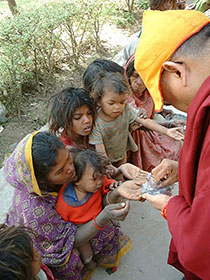- Home
- FPMT Homepage

Foundation for the Preservation of the Mahayana Tradition
The FPMT is an organization devoted to preserving and spreading Mahayana Buddhism worldwide by creating opportunities to listen, reflect, meditate, practice and actualize the unmistaken teachings of the Buddha and based on that experience spreading the Dharma to sentient beings. We provide integrated education through which people’s minds and hearts can be transformed into their highest potential for the benefit of others, inspired by an attitude of universal responsibility and service. We are committed to creating harmonious environments and helping all beings develop their full potential of infinite wisdom and compassion. Our organization is based on the Buddhist tradition of Lama Tsongkhapa of Tibet as taught to us by our founders Lama Thubten Yeshe and Lama Thubten Zopa Rinpoche.
- Willkommen
Die Stiftung zur Erhaltung der Mahayana Tradition (FPMT) ist eine Organisation, die sich weltweit für die Erhaltung und Verbreitung des Mahayana-Buddhismus einsetzt, indem sie Möglichkeiten schafft, den makellosen Lehren des Buddha zuzuhören, über sie zur reflektieren und zu meditieren und auf der Grundlage dieser Erfahrung das Dharma unter den Lebewesen zu verbreiten.
Wir bieten integrierte Schulungswege an, durch denen der Geist und das Herz der Menschen in ihr höchstes Potential verwandelt werden zum Wohl der anderen – inspiriert durch eine Haltung der universellen Verantwortung und dem Wunsch zu dienen. Wir haben uns verpflichtet, harmonische Umgebungen zu schaffen und allen Wesen zu helfen, ihr volles Potenzial unendlicher Weisheit und grenzenlosen Mitgefühls zu verwirklichen.
Unsere Organisation basiert auf der buddhistischen Tradition von Lama Tsongkhapa von Tibet, so wie sie uns von unseren Gründern Lama Thubten Yeshe und Lama Thubten Zopa Rinpoche gelehrt wird.
- Bienvenidos
La Fundación para la preservación de la tradición Mahayana (FPMT) es una organización que se dedica a preservar y difundir el budismo Mahayana en todo el mundo, creando oportunidades para escuchar, reflexionar, meditar, practicar y actualizar las enseñanzas inconfundibles de Buda y en base a esa experiencia difundir el Dharma a los seres.
Proporcionamos una educación integrada a través de la cual las mentes y los corazones de las personas se pueden transformar en su mayor potencial para el beneficio de los demás, inspirados por una actitud de responsabilidad y servicio universales. Estamos comprometidos a crear ambientes armoniosos y ayudar a todos los seres a desarrollar todo su potencial de infinita sabiduría y compasión.
Nuestra organización se basa en la tradición budista de Lama Tsongkhapa del Tíbet como nos lo enseñaron nuestros fundadores Lama Thubten Yeshe y Lama Zopa Rinpoche.
A continuación puede ver una lista de los centros y sus páginas web en su lengua preferida.
- Bienvenue
L’organisation de la FPMT a pour vocation la préservation et la diffusion du bouddhisme du mahayana dans le monde entier. Elle offre l’opportunité d’écouter, de réfléchir, de méditer, de pratiquer et de réaliser les enseignements excellents du Bouddha, pour ensuite transmettre le Dharma à tous les êtres. Nous proposons une formation intégrée grâce à laquelle le cœur et l’esprit de chacun peuvent accomplir leur potentiel le plus élevé pour le bien d’autrui, inspirés par le sens du service et une responsabilité universelle. Nous nous engageons à créer un environnement harmonieux et à aider tous les êtres à épanouir leur potentiel illimité de compassion et de sagesse. Notre organisation s’appuie sur la tradition guéloukpa de Lama Tsongkhapa du Tibet, telle qu’elle a été enseignée par nos fondateurs Lama Thoubtèn Yéshé et Lama Zopa Rinpoché.
Visitez le site de notre Editions Mahayana pour les traductions, conseils et nouvelles du Bureau international en français.
Voici une liste de centres et de leurs sites dans votre langue préférée
- Benvenuto
L’FPMT è un organizzazione il cui scopo è preservare e diffondere il Buddhismo Mahayana nel mondo, creando occasioni di ascolto, riflessione, meditazione e pratica dei perfetti insegnamenti del Buddha, al fine di attualizzare e diffondere il Dharma fra tutti gli esseri senzienti.
Offriamo un’educazione integrata, che può trasformare la mente e i cuori delle persone nel loro massimo potenziale, per il beneficio di tutti gli esseri, ispirati da un’attitudine di responsabilità universale e di servizio.
Il nostro obiettivo è quello di creare contesti armoniosi e aiutare tutti gli esseri a sviluppare in modo completo le proprie potenzialità di infinita saggezza e compassione.
La nostra organizzazione si basa sulla tradizione buddhista di Lama Tsongkhapa del Tibet, così come ci è stata insegnata dai nostri fondatori Lama Thubten Yeshe e Lama Zopa Rinpoche.
Di seguito potete trovare un elenco dei centri e dei loro siti nella lingua da voi prescelta.
- 欢迎 / 歡迎
简体中文
“护持大乘法脉基金会”( 英文简称:FPMT。全名:Foundation for the Preservation of the Mahayana Tradition) 是一个致力于护持和弘扬大乘佛法的国际佛教组织。我们提供听闻,思维,禅修,修行和实证佛陀无误教法的机会,以便让一切众生都能够享受佛法的指引和滋润。
我们全力创造和谐融洽的环境, 为人们提供解行并重的完整佛法教育,以便启发内在的环宇悲心及责任心,并开发内心所蕴藏的巨大潜能 — 无限的智慧与悲心 — 以便利益和服务一切有情。
FPMT的创办人是图腾耶喜喇嘛和喇嘛梭巴仁波切。我们所修习的是由两位上师所教导的,西藏喀巴大师的佛法传承。
繁體中文
護持大乘法脈基金會”( 英文簡稱:FPMT。全名:Found
ation for the Preservation of the Mahayana Tradition ) 是一個致力於護持和弘揚大乘佛法的國際佛教組織。我們提供聽聞, 思維,禪修,修行和實證佛陀無誤教法的機會,以便讓一切眾生都能 夠享受佛法的指引和滋潤。 我們全力創造和諧融洽的環境,
為人們提供解行並重的完整佛法教育,以便啟發內在的環宇悲心及責 任心,並開發內心所蘊藏的巨大潛能 — 無限的智慧與悲心 – – 以便利益和服務一切有情。 FPMT的創辦人是圖騰耶喜喇嘛和喇嘛梭巴仁波切。
我們所修習的是由兩位上師所教導的,西藏喀巴大師的佛法傳承。 察看道场信息:
- FPMT Homepage
- News/Media
-
- Study & Practice
-
-
- About FPMT Education Services
- Latest News
- Programs
- New to Buddhism?
- Buddhist Mind Science: Activating Your Potential
- Heart Advice for Death and Dying
- Discovering Buddhism
- Living in the Path
- Exploring Buddhism
- FPMT Basic Program
- FPMT Masters Program
- FPMT In-Depth Meditation Training
- Maitripa College
- Lotsawa Rinchen Zangpo Translator Program
- Universal Education for Compassion & Wisdom
- Online Learning Center
-
- Prayers & Practice Materials
- Overview of Prayers & Practices
- Full Catalogue of Prayers & Practice Materials
- Explore Popular Topics
- Benefiting Animals
- Chenrezig Resources
- Death & Dying Resources
- Lama Chopa (Guru Puja)
- Lama Zopa Rinpoche: Compendium of Precious Instructions
- Lama Zopa Rinpoche: Life Practice Advice
- Lama Zopa Rinpoche Practice Series
- Lamrim Resources
- Mantras
- Prayer Book Updates
- Purification Practices
- Sutras
- Thought Transformation (Lojong)
- Audio Materials
- Dharma Dates - Tibetan Calendar
- Translation Services
- Publishing Services
- Ways to Offer Support
- Prayers & Practice Materials
-
- Teachings and Advice
- Find Teachings and Advice
- Lama Zopa Rinpoche Advice Page
- Lama Zopa Rinpoche: Compendium of Precious Instructions
- Lama Zopa Rinpoche Video Teachings
- ༧སྐྱབས་རྗེ་བཟོད་པ་རིན་པོ་ཆེ་མཆོག་ནས་སྩལ་བའི་བཀའ་སློབ་བརྙན་འཕྲིན།
- Podcasts
- Lama Yeshe Wisdom Archive
- Buddhism FAQ
- Dharma for Young People
- Resources on Holy Objects
- Teachings and Advice
-
-
*If a menu item has a submenu clicking once will expand the menu clicking twice will open the page.
-
-
- Centers
-
- Teachers
-
- Projects
-
-
-
-
*If a menu item has a submenu clicking once will expand the menu clicking twice will open the page.
-
-
- FPMT
-
-
-
-
-
Proper guru devotion – correct devotion to your virtuous friends – allows you to actualize successfully all the steps of the path to enlightenment, from the perfect human rebirth up to buddhahood itself.
Lama Zopa Rinpoche
-
-
-
- Shop
-
-
-
The Foundation Store is FPMT’s online shop and features a vast selection of Buddhist study and practice materials written or recommended by our lineage gurus. These items include homestudy programs, prayers and practices in PDF or eBook format, materials for children, and other resources to support practitioners.
Items displayed in the shop are made available for Dharma practice and educational purposes, and never for the purpose of profiting from their sale. Please read FPMT Foundation Store Policy Regarding Dharma Items for more information.
-
-
FPMT News Around the World
28
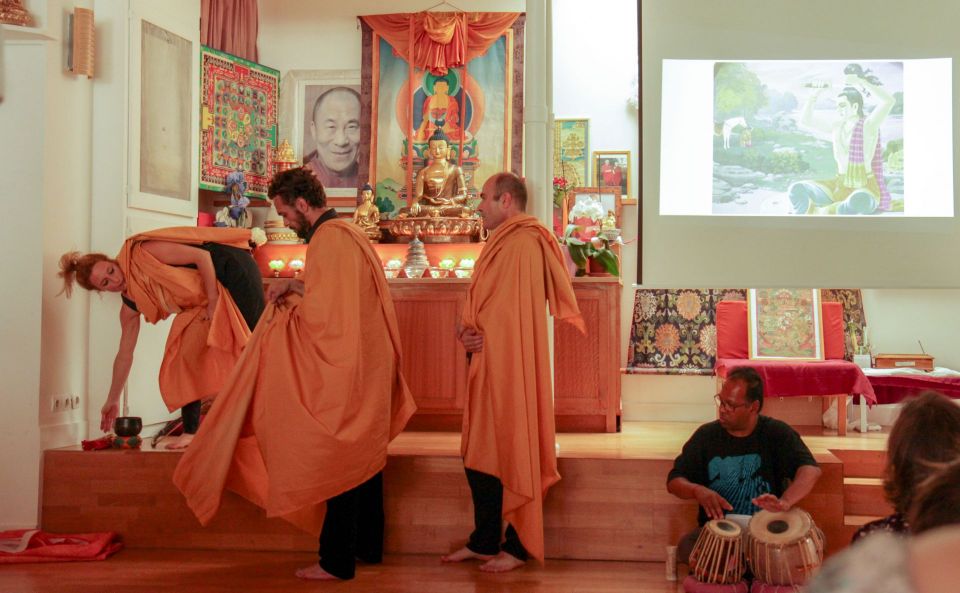
Justine, Yanis, Franck, and Raj in the performance of Shakyamuni Buddha’s life story at Kalachakra Centre, Paris, France, June 2019. Photo by Laura Haughey.
Kalachakra Centre, the FPMT center in Paris, France, held their fifth-annual Fête de la Réjouissance on June 30, 2019. Laura Haughey, a student at the center shares the story.
On June 30, 2019, Centre Kalachakra held a joyous and convivial “Fête de la Réjouissance” (Feast of Rejoicing) to celebrate the end of another season of activities before the summer break. The activities of Centre Kalachakra shift during the summer months from the Paris location to our peaceful and beautiful retreat center, Saint Cosme en Vairais retreat centre, in the Perche, about two hours southwest of Paris.
Center director Ven. Elisabeth Drukier reports that the Fête has been held for the past five years, and this year about thirty to forty students, teachers, and volunteers gathered together to share a vegetarian feast and wonderful dramatic performance. The delicious meal was generously provided by the local Tamil community, who regularly use the center’s gompa for their community activities. Also in attendance at the event were the Centre Kalachakra’s resident teacher Geshe Drakpa Tsundue, as well as Geshe Dawa Tsering who was visiting from Kopan Monastery in Nepal.
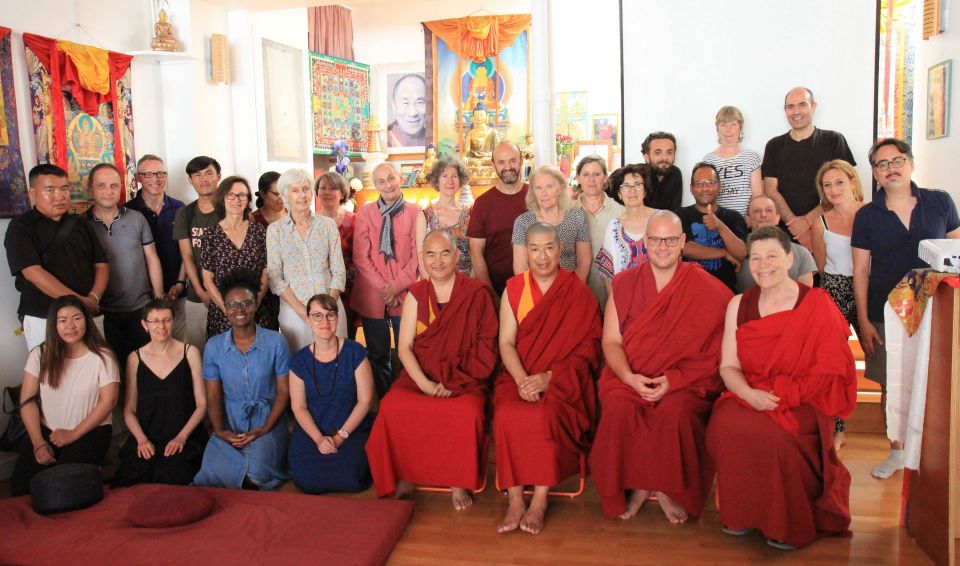
Fête de la Réjouissance at Kalachakra Centre, Paris, France, June 2019. Photo by Laura Haughey.
This year, Justine Wolski, a Discovering Buddhism student with professional theater training and experience, reacted very quickly and with great enthusiasm when it was suggested that a play about the life of Shakyamuni Buddha might be a good way to end the year. Justine organized, directed, and performed in the dramatic recounting of the life of Prince Siddhartha, with help from Ven. Deunyeu, the center’s treasurer (who wrote the script and chose the accompanying images) and fellow students and volunteers Raj, Franck, and Gwenael. The moving and creatively staged play followed the stages of the Awakened One’s human life as a child, a prince, a householder, an ascetic, a seeker, and a teacher, accompanied by the sounds of tabla drums, music, and visual images.
The students’ entertaining and skillfully staged performance was warmly and enthusiastically appreciated by the group and was a fitting end to a wonderful year at the center.
For more information about Kalachakra Centre in Paris and its retreat facility, visit their website:
https://www.centre-kalachakra.com/#
FPMT.org and Mandala Publications brings you news of Lama Zopa Rinpoche and of activities, teachings, and events from over 160 FPMT centers, projects, and services around the globe. If you like what you read, consider becoming a Friend of FPMT, which supports our work.
21
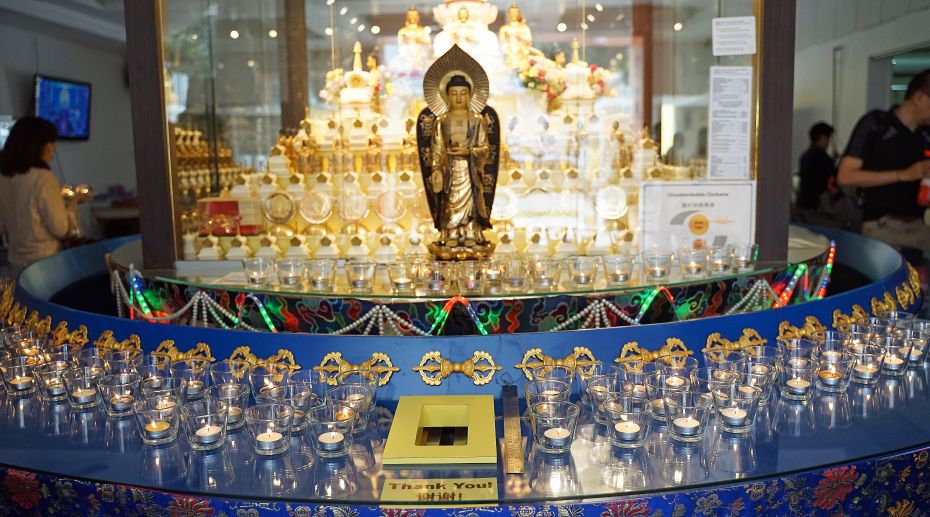
Amitabha Buddhist Centre, Singapore, September 2018. Photo by Tan Seow Kheng.
Lama Yeshe advised in The Peaceful Stillness of the Silent Mind, “The ordinary understanding of charity is giving things to others, but as you can see, the Buddhist point of view is that material giving is not necessarily charity. True charity has to do with the mind; giving mentally. The practice of giving is training the mind to overcome miserliness. Miserly attachment is in the mind, therefore, the antidote must also be mental.”
We invited several FPMT centers—Amitabha Buddhist Centre in Singapore; Losang Dragpa Centre in Selangor, Malaysia; Kadampa Center in Raleigh, North Carolina, US; Land of Joy in Northumberland, UK; and Vajrapani Institute in Boulder Creek, California, US—to share how they provide their communities with opportunities to train the mind in the practice of charity, or generosity. This is an excerpt from that online story, “Training the Mind in Generosity.”
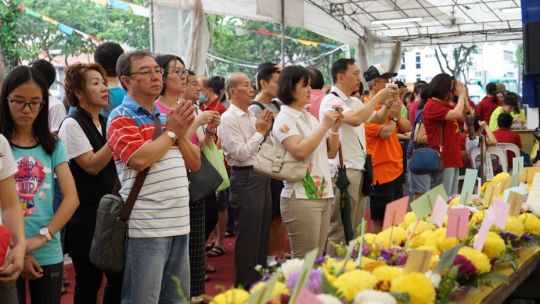
Vesak Celebration, Amitabha Buddhist Centre, Singapore, May 2017. Photo by Tan Seow Kheng.
Amitabha Buddhist Centre
Singapore
Cecilia Tsong, long-time student, active ABC member and volunteer
Amitabha Buddhist Centre (ABC)’s success in fundraising and Dharma propagation has its roots in the guidance and advice we receive from Kyabje Lama Zopa Rinpoche. We are also fortunate to have a long-serving, well-liked center director, Tan Hup Cheng, who seems to have the Midas touch when it comes to sourcing for financial support.
It helps too, that ABC is in a cultural environment where many have faith in the Triple Gem and believe in the benefit of making offerings to temples and Dharma centers, commissioning holy objects, as well as supporting Dharma publications and various Buddhist initiatives.
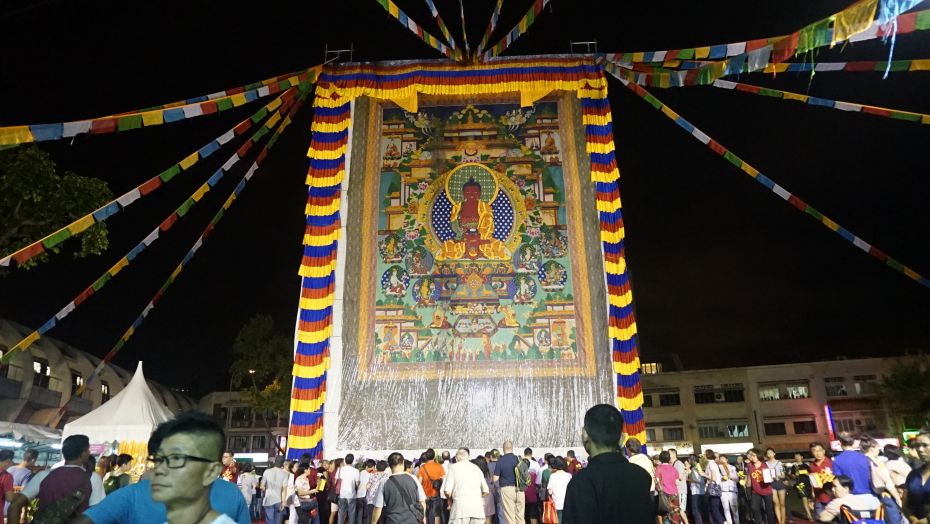
Vesak at Amitabha Buddhist Centre, Singapore, May 2017. Photo by Tan Seow Kheng.
As part of their cultural values, Chinese people have a strong belief in the law of cause and effect, even though they may not necessarily be practicing Buddhists. Often, they will support temples, Dharma activities, and ordained Sangha with funds so that they may enjoy prosperity and happiness in this life.
Through a better understanding of the Dharma by attending teachings at ABC, students learn that generosity can be practiced in other ways: offering service to the center, participating in animal liberation activities to protect the lives of animals, and sharing their understanding of the Dharma with newer students.
ABC’s main fundraising drive takes place every year on Vesak Day, a public holiday in Singapore. This is a time when the general public is inclined to make offerings as a way of remembering the kindness of Shakyamuni Buddha and requesting his blessings for a life well-lived.
Mindful that Dharma is priceless, local Buddhist centers and temples offer Dharma teachings free of charge. However, ABC does levy a nominal charge for Nyung näs and one-day retreats to cover the costs of meals, refreshments, and altar offerings. ABC also organizes pilgrimages and retreats overseas, and every effort is made to keep prices low. For these activities, there is differential pricing for ABC and non-ABC members.
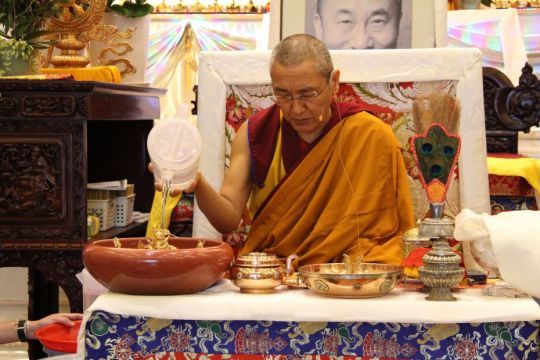
FPMT resident geshe Khen Rinpoche Geshe Chonyi during an Ullambana puja at Amitabha Buddhist Centre, Singapore, August 2014. Photo by Noelle Teoh.
Apart from Vesak Day programs, ABC has developed special Dharma events over the years to bring more people to the center. The Medicine Buddha Dharma celebration, Most Secret Hayagriva puja, and Ullambana puja are popular and have been attracting a growing group of participants each year. Corporate sponsorships are available for these pujas, an option that appeals greatly to local business people.
For those who love all things beautiful, we have a well-curated collection of Dharma objects—statues, malas, offering bowls, prayer wheels, prayer flags, incense, thangkas, and so forth—that are available at our Tashi Delek retail store. This generates additional income that is pumped back into serving the center’s needs.
In its fundraising activities—including its Dharma shop—ABC is fastidious in making sure that these funds are used in accordance with the donors’ wishes. Also, when holy objects are sponsored from the Dharma shop, such income is directed to supporting the maintenance and building fund of the center, and not to the support of the Sangha as such.
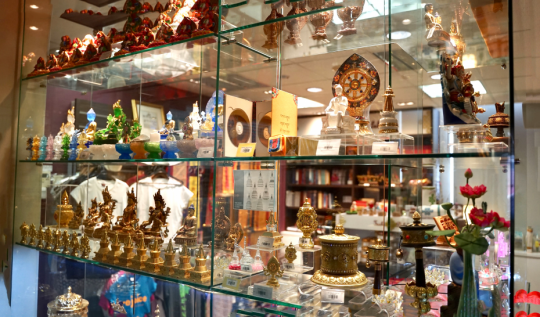
Tashi Delek retail store at Amitabha Buddhist Centre, Singapore, September 2018. Photo by Tan Seow Kheng.
Lastly, as an on-going fundraising drive, ABC runs a program of electronic debit sponsorships, where people can choose to have regular deductions made from their bank accounts.
There are also donation boxes in the center for our building and maintenance fund, Sangha fund, publications, animal liberation, puja fund, and general funds. Visitors are free to drop their offerings—and say a silent prayer in the sacred ambiance of the merit-field—while recalling the words of Lama Zopa Rinpoche in The Four Noble Truths: A Guide for Everyday Life, “Be as generous as we can to benefit the poor and sick. Make offerings to holy objects and other living beings, and dedicate this generosity for the happiness and enlightenment of all beings. Doing so offers great release to our minds.”
Read the full online story, “Training the Mind in Generosity,” online:
https://fpmt.org/mandala/in-depth-stories/training-the-mind-in-generosity/
For more information about Amitabha Buddhist Centre, visit their website:
http://www.fpmtabc.org/
FPMT.org and Mandala Publications brings you news of Lama Zopa Rinpoche and of activities, teachings, and events from over 160 FPMT centers, projects, and services around the globe. If you like what you read, consider becoming a Friend of FPMT, which supports our work.
- Tagged: amitabha buddhist centre, cecilia tsong
13
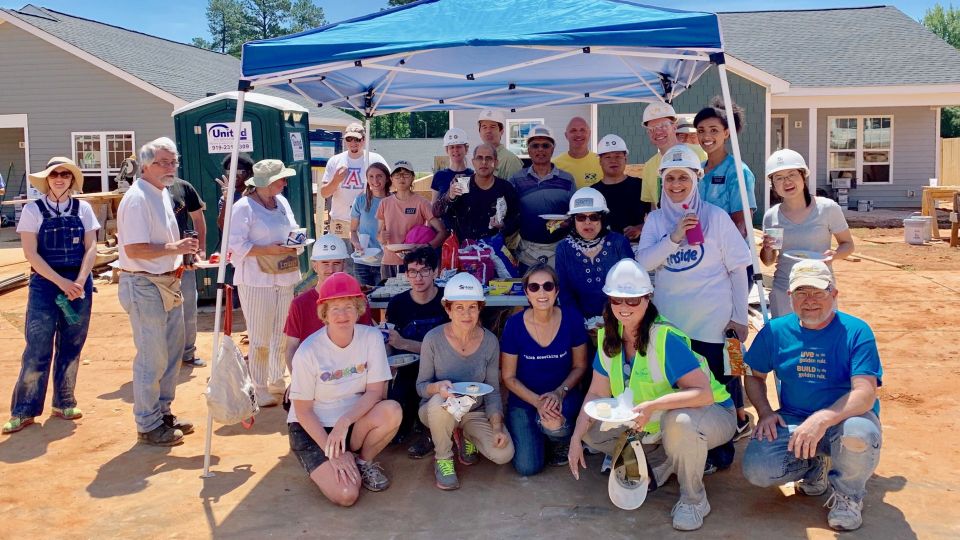
Habitat for Humanity community service project, North Carolina, US, June 2019. Photo courtesy of Kadampa Center.
Kadampa Center, an FPMT center in Raleigh, North Carolina, US, shares about their community service program, Compassion in Action. Community Service and Interfaith Activities are two of FPMT’s Five Pillars of Service. Elise Strevel, the center’s outreach coordinator, a member of the center’s management team, initiates and coordinates most Compassion in Action activities. Elise shares how any FPMT center, regardless of its size, can practice Compassion in Action as an intentional outgrowth of the teachings.
His Holiness the Dalai Lama wrote in his book The Art of Happiness, “I believe compassion to be one of the few things we can practice that will bring immediate and long-term happiness to our lives.” Lama Zopa Rinpoche demonstrates this endless capacity for benefiting others through the many charitable projects he has initiated, supported, and developed.
The Kadampa Center tries to follow this excellent advice by participating in various forms of community service projects, also known at our center as Compassion in Action.
Most of the community service projects Kadampa Center engages in connects us to groups that already exist in the community. We partner with established organizations that are inclusive and welcoming to all such as food pantries and Habitat for Humanity. Even if organizations are nominally established by another faith organization, they desire and welcome coexistence, cooperation, and support from all. In the past year we participated in interfaith prayer services, a Food Bank of North Carolina food drive, a Sathya Sai Baba community prescription eyeglasses drive, a Meals on Wheels project, a local government’s Adopt-a-Stream program, a Rise Against Hunger project, and three Habitat for Humanity projects.
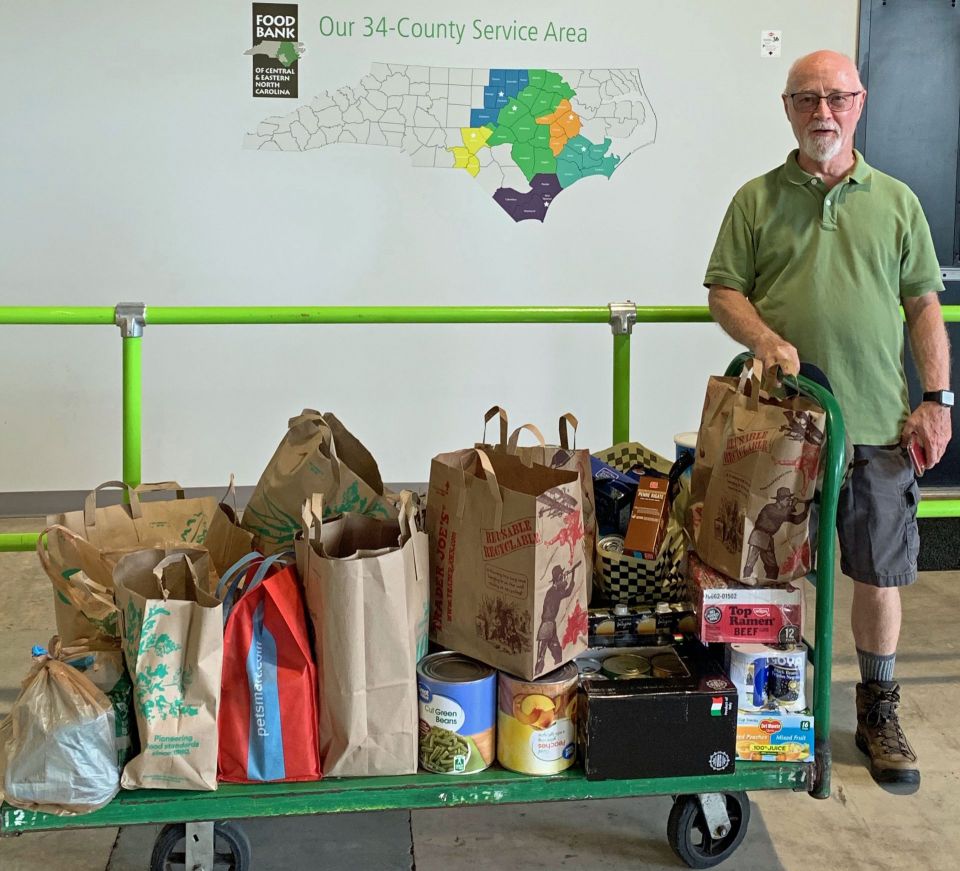
The Kadampa Center community donated 504 pounds (228 kg) of food to the Food Bank of North Carolina, North Carolina, US, July 2019. Photo courtesy of Kadampa Center.
In this way we are adding to or multiplying positive energy, rather than depleting energy by creating our own start-up project. We select community service projects managed by other organizations that accommodate the various ages, abilities, and interests of our members. Some interfaith group community service projects are chosen for their additional value of being in harmony with His Holiness’s commitment to promote religious harmony.
An affiliation between Kadampa Center and our local interfaith alliance facilitates many of these connections. I have had the blessing of being on the Triangle Interfaith Alliance board of directors on and off for over ten years. Chris Baranski, our center’s co-media coordinator, has also just joined the board.
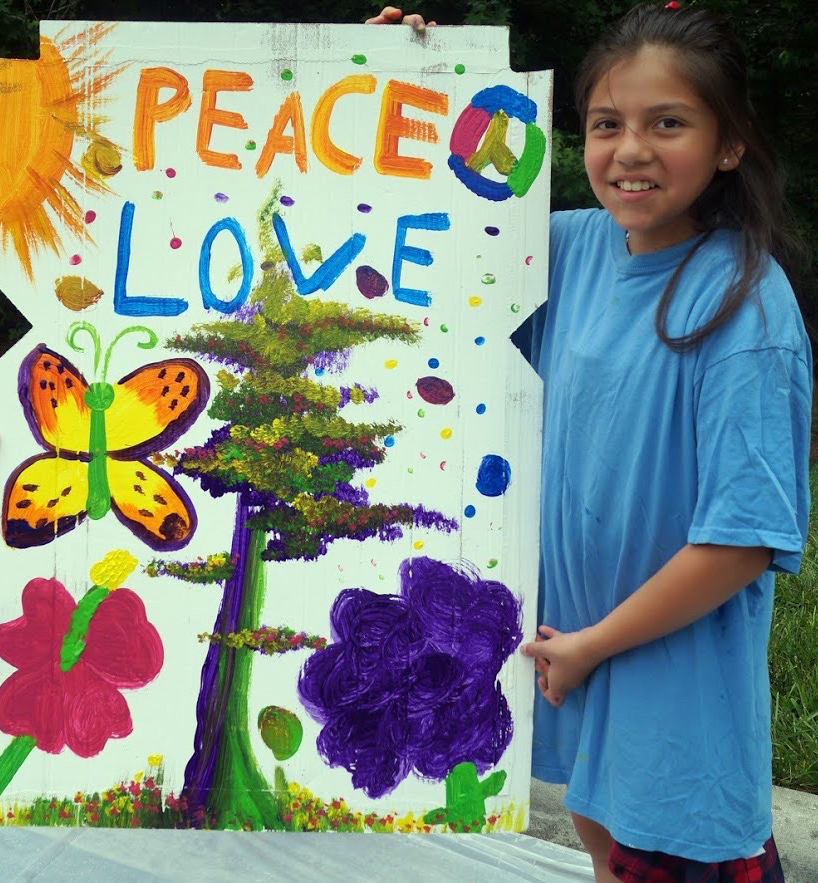
Habitat for Humanity children’s community service project, North Carolina, US, April 2019. Photo courtesy of Kadampa Center.
We use every possible means to get the word out to the Kadampa Center community about our Compassion in Action activities, just as we do for any spiritual or social activity at the center: we put a notice on our website; in our email newsletter; and post it on our center’s Facebook page. Most Sundays, the outreach coordinator makes an announcement at the end of the teachings.
At least twice a year, adults and children at Kadampa Center are reminded to think of the needs of others as they shop for themselves. For the food, clothing, and household supplies collections we participate in, all the Kadampa Center outreach coordinator has to do is identify a need, promote it, provide a collection barrel at Kadampa Center, and arrange delivery to the Food Bank of North Carolina. In the past year we collected hundreds of pounds of food to benefit so many in food crisis.
Kadampa Center participates in Interfaith Prayer Services held three times each year in rotating places of worship or prayer. We invite people of all ages from various faith streams to participate by offering a prayer or anecdote on a theme. These services underscore our common ethics of love and compassion.
Each year, Kadampa Center does a Prescription Eyeglasses Collection. Members donate dozens of outdated prescription eyeglasses to be put to good use to give the gift of vision at a Free Healthcare Day organized by the local Sathya Sai Baba community.
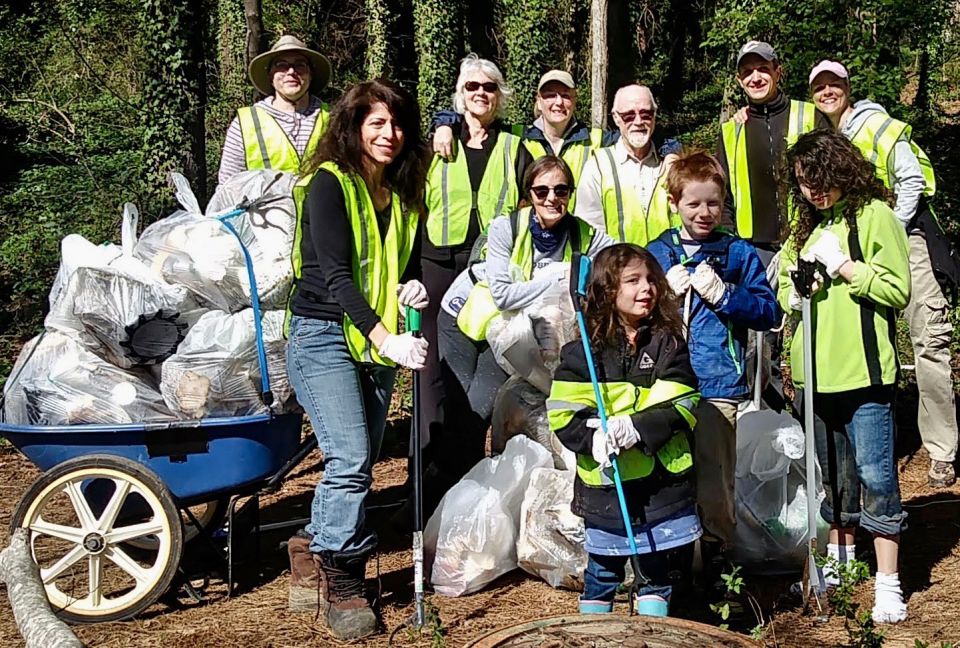
Adopt a Stream community service project, North Carolina, US, March 2019. Photo courtesy of Kadampa Center.
For the “Love Notes” Project, brief handwritten notes of love and encouragement were delivered to Meals On Wheels, and then distributed to Meals on Wheels clients along with their meal trays. We organized the materials—sets of blank note cards and sample notes to write—set up a collection site at Kadampa Center, then made delivery of the notes to the local Meals on Wheels office about once a month. Our members of all ages were able to participate in this project. Some might have only had time to write a few cards, others did many. Almost 2,000 notes were delivered in a year.
One of our center’s Family Program leaders initiated an affiliation with our city’s Adopt-a-Stream Project. Twice a year, children and adults work together to clean up a lake shoreline for the benefit of many forms of sentient beings. At each cleanup we collected between thirteen and fifteen bags of trash on less than a one-mile stretch of the water’s edge.
We partnered with the international nonprofit Rise Against Hunger which sends packed meals to places all over the world during food crises. Our members were part of a group of fifty people who participated in a food packing event, packing 10,000 meals that were sent to victims of natural disasters in Africa and Cambodia.
We have found that Habitat for Humanity more often has opportunities for adults of all ages and skill levels, but sometimes has special opportunities for clergy/leaders, and children.
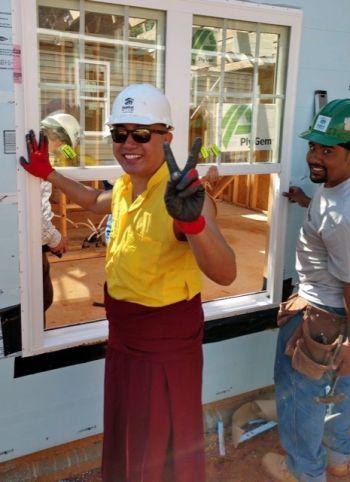
Geshe Palden Sangpo at a Habitat for Humanity community service project, North Carolina, US, April 2019. Photo courtesy of Kadampa Center.
In June, adults from our center were a part of a group of twenty-nine Habitat for Humanity volunteers who came together for a single day to clean, paint, and install wood trim and cabinets. The volunteer group represented Buddhist, Bahá’í, Muslim, Mormon, Lutheran, and other Christian and non-denominational faith streams from North Carolina, Utah, Japan, and Thailand.
Each year, Habitat for Humanity organizes a Clergy/Leadership Workday. In April, Geshe Palden Sangpo, one of our FPMT resident geshes set an example of Compassion in Action by working along with rabbis, ministers, imams and other church leaders to install windows and walls to benefit a new homeowner.
In April, Habitat for Humanity organized a Baffle Project for Children. The Kadampa Center Family Program involved our children in the project. They joined others from many faiths and cultures to paint messages of love and blessings on baffles, a construction material that encourages air flow in attics. The baffles were then installed in Habitat for Humanity homes.
We have learned that even a team of two people who are acting intentionally as an outgrowth of the teachings has immeasurable merit. We can have two to fifteen people participate in a community service project. The number isn’t as important as the intention in action.
Each time our center provides an opportunity for Compassion in Action, many members that were unable to physically participate tell us that hearing of others’ participation inspires, uplifts, and motivates them to set intentions in their lives to think of others. We are delighted that community service projects directly and indirectly benefit many members and sentient beings.
For more information about Kadampa Center, visit their website:
https://kadampa-center.org/
FPMT.org and Mandala Publications brings you news of Lama Zopa Rinpoche and of activities, teachings, and events from over 160 FPMT centers, projects, and services around the globe. If you like what you read, consider becoming a Friend of FPMT, which supports our work.
- Tagged: community service, community-social service pillar, elise strevel, geshe palden sangpo, interfaith, interfaith pillar, kadampa center
7
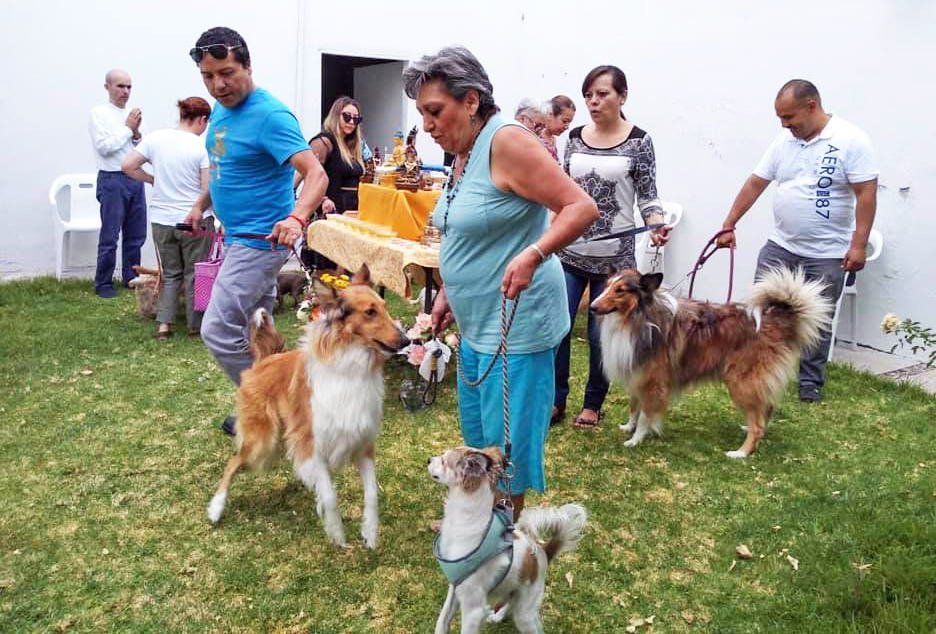
Laura Lugo, Othniel Bautista, other people, and dogs circumambulating while Geshe Lobsang Dawa guides the activity, Aguascalientes, Mexico, May 2019. Photo by Maria Dolores Santillan Perez.
Bengungyal Center, an FPMT center in Aguascalientes City, Mexico, organized animal blessing and liberation practices on February 11 and May 25, 2019. Laura Lugo Vàzquez, center director shares the story.
Following the Mahayana Buddhist teachings, Bengungyal Center carried out an animal blessing and liberation practice on February 11, 2019. The practice of animal blessing and liberation means a lot to us because it frees obstacles and generates compassion, and it’s an opportunity to help animals get a better life.
Animals possess the seeds of spiritual awakening and as their protectors we have the opportunity to benefit them by putting them in contact with the sacred sphere. This will help the animals obtain good rebirths in their next lives and eventually escape the cycle of suffering.
We have done this practice on approximately five different occasions. We decided to do this practice again because an ordained Sangha member—Ven. Tenzin Yampel, a Mexican monk ordained by His Holiness the Dalai Lama, who has offered services at FPMT centers in the United States, France, Nepal, and Mexico—was going to be with us at the center.
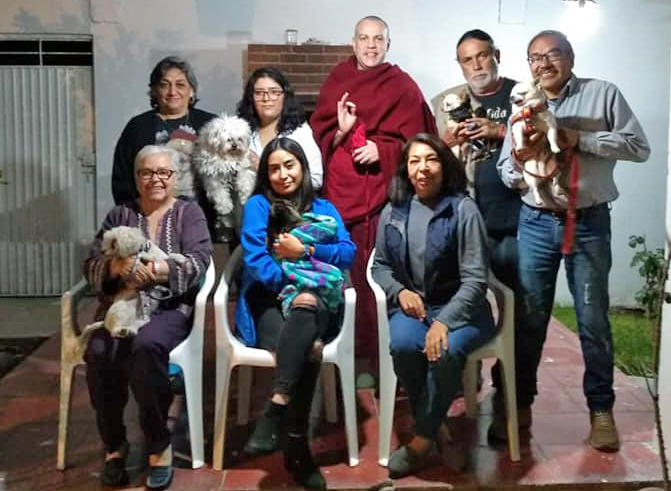
Laura Lugo, Andrea, Ven. Tenzin Yampel, Thomas, a friend of Thomas, Paty Mendez, Cristina Reynoso, Raquel Santillán, and dogs, Aguascalientes, Mexico, February 2019. Photo by Maria Dolores Santillan Perez.
In the practice we did in February, worms and birds were freed, while dogs were blessed. The people who participated were regular attendees of the center and fellow members of the local Buddhist community. They brought their animals to the center for the blessing. They were blessed with two relics that the center has. The human participants prayed and recited mantras all around the sacred objects.
All the positive energy was dedicated to the benefit and happiness of all living beings, as well to the long lives of our spiritual teachers.
Also, thank you to everyone who participated in the animal blessing and liberation activities held in May 2019 with Geshe Lobsang Dawa, a Mexican FPMT registered geshe. Together we are learning to spiritually benefit these beings that we love so much. Thank you to those who came with their pets to the blessing. There were a lot of new people who are not members of our center.
Animal blessing practice can be done by students on their own, in other words, a teacher or ordained Sangha member is not needed to lead the practice. For more on practices to benefit animals, see:
https://fpmt.org/education/prayers-and-practice-materials/benefiting-animals-practices-and-advice/
For more information about Bengungyal Center, visit their Facebook page:
https://www.facebook.com/MeditacionCentroBengungyal/
FPMT.org and Mandala Publications brings you news of Lama Zopa Rinpoche and of activities, teachings, and events from over 160 FPMT centers, projects, and services around the globe. If you like what you read, consider becoming a Friend of FPMT, which supports our work.
31
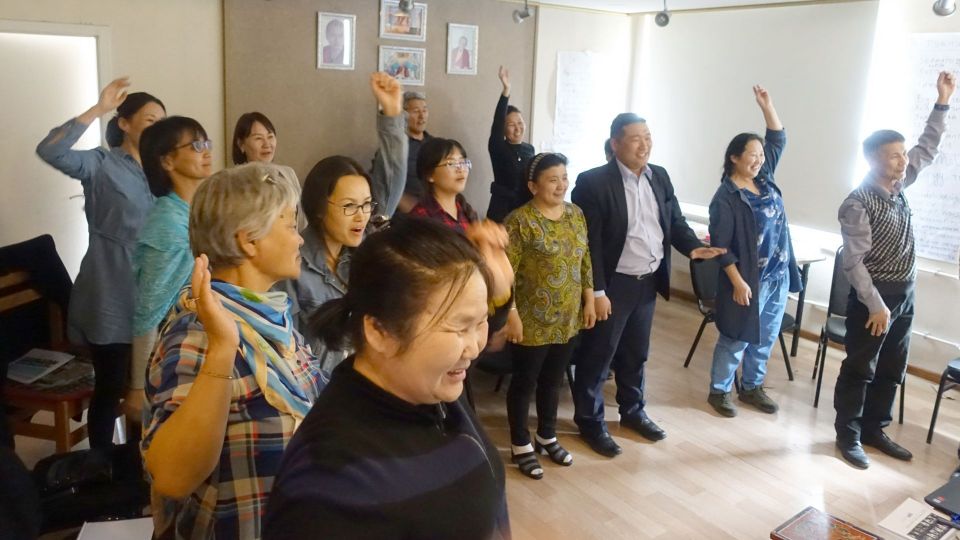
Workshop participants enjoying an activity called Brain Gym, Ganden Do Ngag Shedrup Ling, Ulaanbaatar, Mongolia, April 2019. Photo by Ianzhina Bartanova.
In April 2019, Ganden Do Ngag Shedrup Ling, the FPMT center in Ulaanbaatar, Mongolia, offered a 16 Guidelines for Life workshop facilitated by Wendy Ridley, a Foundation for Developing Compassion and Wisdom (FDCW) Senior Accredited Faculty member and board member, as well as an FPMT Foundation Service Seminar facilitator and FPMT registered teacher. Ianzhina Bartanova, center director shares the story, which incorporates all 16 Guidelines for Life: humility, patience, contentment, delight, kindness, honesty, generosity, right speech, respect, forgiveness, gratitude, loyalty, aspiration, principles, service, and courage.
During Lama Zopa Rinpoche’s visit to Mongolia in May 2017, Rinpoche expressed the wish for our staff to learn the lamrim. Although lamrim teachings are regularly offered at our center, most of our staff are not Dharma students so do not attend. Therefore we thought instead it would be more appropriate to offer our staff 16 Guidelines for Life.
Rinpoche also advised us to start using the 16 Guidelines for Life as a way for young people to learn English. We trained our new teacher Altangerel, developed student materials, and adapted the 16 Guidelines for Life program for children and adults to learn English. We discussed sending Altangerel to the 16 Guidelines Retreat Gathering hosted by FDCW national group Education Universelle France held in 2018 at Institut Vajra Yogini, the FPMT center in Toulouse, France, but realized that the costs would be beyond our budget. The thought arose to bring a 16 Guidelines for Life facilitator to Mongolia so that we could involve more people in the training and invite local guests. So in order to fulfill Lama Zopa Rinpoche’s advice and accomplish our goals, we initiated this workshop.
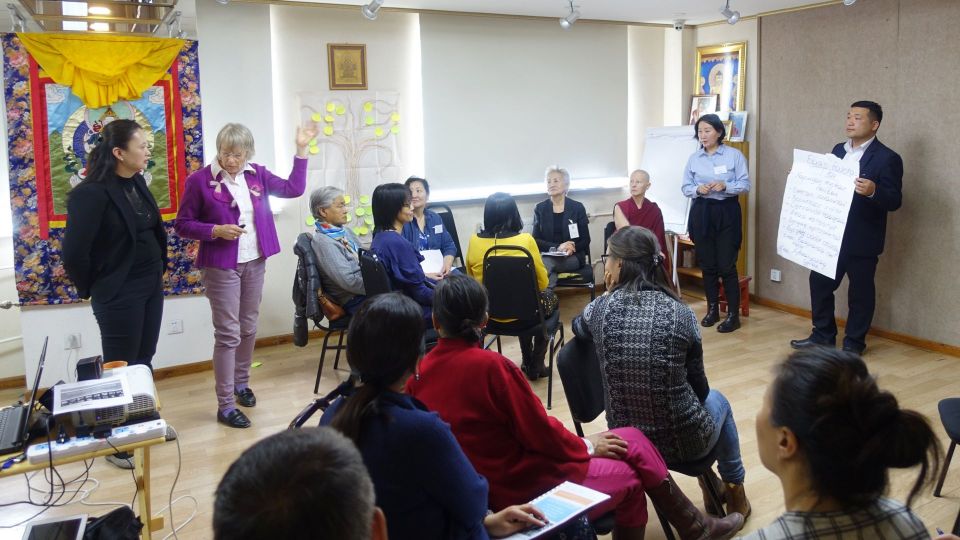
Bayarbaatar, a social worker in a high security prison, and Khulan, Ganden Do Ngag Shedrup Ling spiritual program coordinator, presenting Delight, one of the 16 Guidelines while Altangerel, Ganden Do Ngag Shedrup Ling 16 Guidelines English teacher, translates for Wendy Ridley, workshop facilitator, Ganden Do Ngag Shedrup Ling, Ulaanbaatar, Mongolia, April 2019. Photo by Ianzhina Bartanova.
Wendy offered the 16 Guidelines for Life level 1 workshop over the course of five weekdays, from 10 a.m. until 3 p.m. with one-hour lunch breaks. Our center was delighted to be able to provide this workshop and vegan lunches to all participants free of charge. A local benefactor also generously provided snacks and refreshments.
Thirty-one people came to learn the tools of how to live a happy life. Most were our staff members, plus two high security prison social workers and a prison psychologist. Participants also included a seventeen-year old student, a Buddhist nun, a teacher, a cook, a benefactor, a center guard, a board member, a center driver, a cleaner, an engineer, and an English teacher and translator. Initially reserved and shy, it was wonderful to see this diverse group opening up and working so harmoniously together.
For the majority, it was their first experience learning through active participation in class. Most had studied according to the Soviet educational system, where all students were required to take the same standardized classes, which many experienced as inflexible and suppressive. So for them Wendy’s workshop was an eye-opening, completely fresh, modern, interactive, and amusing approach to learning.
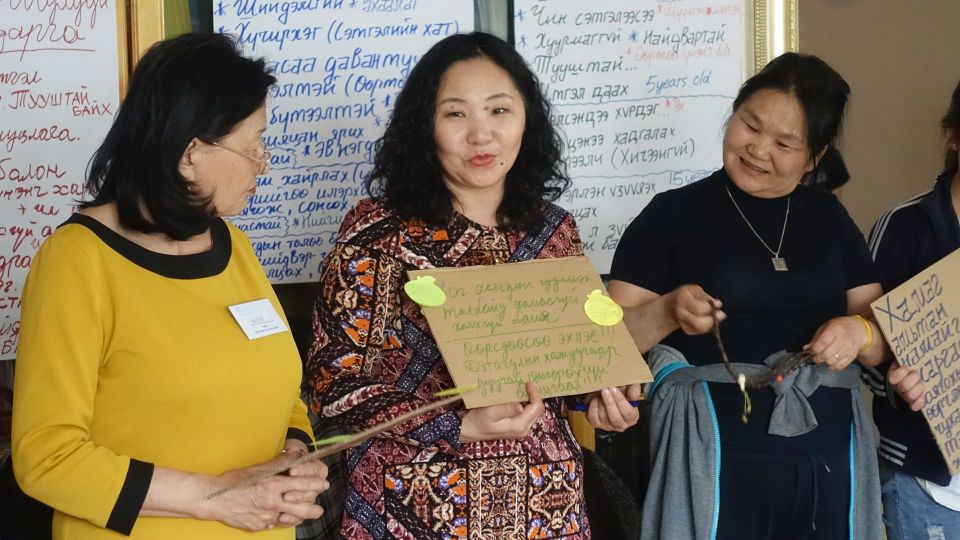
Adiya, teacher; Dolgorsuren, guest participant; and Erdenechimea, Ganden Do Ngag Shedrup Ling supporter, sharing a wish for change is street litter and the intention to lead by example, Ganden Do Ngag Shedrup Ling, Ulaanbaatar, Mongolia, April 2019. Photo by Ianzhina Bartanova.
The art activities demonstrated participants’ creativity, honesty, and sensitivity to global problems such as environmental issues. Likewise the activities highlighted the importance of being patient, humble, and at the same time courageous in order to make any positive changes in daily life. While doing an art project participants felt emotionally overwhelmed while explaining the meaning of a fulfilled life, sharing, “If everyone could be kind … how wonderful it would be.”
Participants found ”forgiveness” to be one of the most challenging guidelines, and ”right speech” a key to skillful communication. All participants were completely involved, open, and driven by the 16 Guidelines for Life energy. During group presentations each member contributed wholeheartedly; no one remained silent. Participants were inspired by the stories of role models from all over the world, especially Helen Keller and Greta Thunberg, because through sharing their principles and aspirations they encourage other people to never give up and stand up for change.
The 16 Guidelines for Life tools of mindfulness and mind and heart reflection were participants’ favorites, as well as the brain gym as a relaxation exercise. In written feedback participants also expressed contentment, gratitude to FDCW and Wendy, loyalty to our center, respect for the curriculum, and that they learned the 16 Guidelines for Life methods well. The workshop inspired them to continue carrying out 16 Guidelines for Life approaches and following the 16 Guidelines for Life path. Many want to take part in the next step on the path, FDCW’s Building on the Basics Program and the 16 Guidelines for Life level 2 workshop.
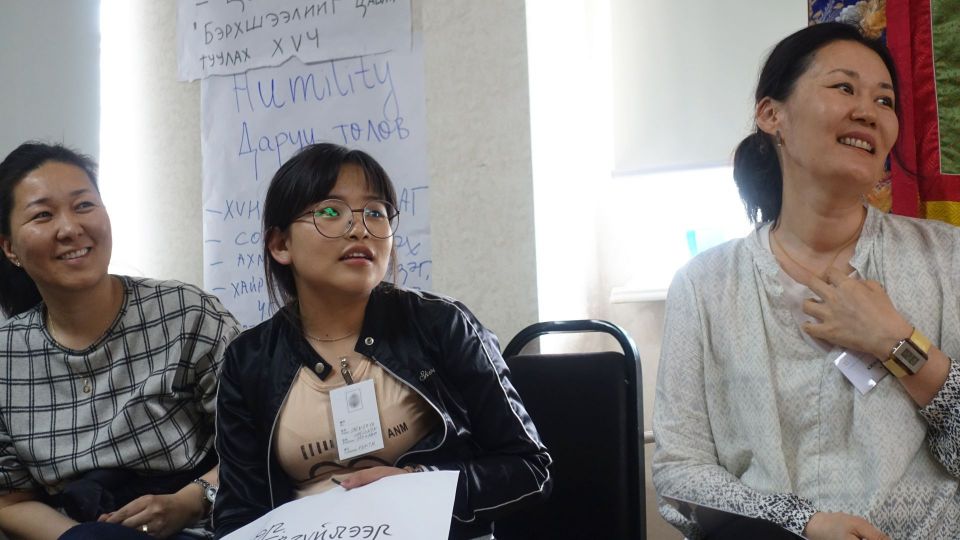
Enkh-Amar, Ganden Do Ngag Shedrup Ling staff member; Sainzaya, Ganden Do Ngag Shedrup Ling Mahayana Children’s Program student; and Khaliun, a guest participant sharing, their personal stories, Ganden Do Ngag Shedrup Ling, Ulaanbaatar, Mongolia, April 2019. Photo by Ianzhina Bartanova.
Our 16 Guidelines for Life level 1 workshop will make a positive impact on our Mahayana Children’s Program; 16 Guidelines for Life in English Program; the activities of Golden Light Sutra Center in Darkhan city; and the working relationships between our staff members. Our staff shared the workshop will also benefit “their productivity, daily life, and their ability to see things more positively.”
One participant shared, “I have learned about 16 Guidelines for Life in real life experience and started to implement the 16 Guidelines for Life in my daily routine, and I think it is really helpful. I am trying very hard to set up these guidelines as a habit. That training was amazing and effective.”
We would like to acknowledge that many people worked hard to make this event possible: our FPMT resident teacher Ven. Thubten Gyalmo, who offered her experience, calm demeanor, and support; Wendy, for traveling from the UK to teach us; our invaluable workshop translators, Altangerel and Khulan, who also worked with Duya to kindly prepare all translations of the documents and the PowerPoint slides with Khongor, who although not with us, assisted with translation from New Zealand; plus many others in our office and the FDCW office.
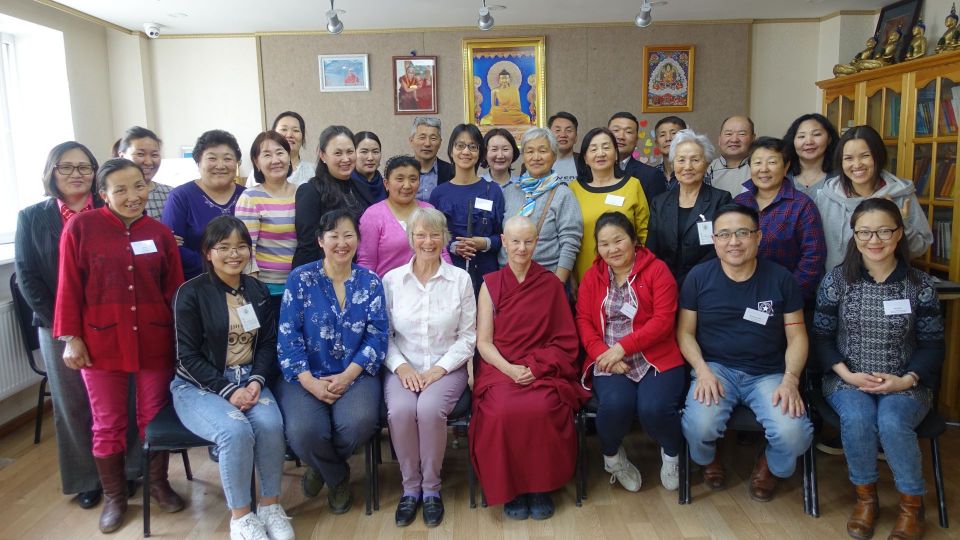
16 Guidelines for Life participants with Wendy Ridley, facilitator, Ganden Do Ngag Shedrup Ling, Ulaanbaatar, Mongolia, April 2019. Photo by Ianzhina Bartanova.
Following the 16 Guidelines for Life workshop Wendy offered another program, a Taste of the Foundation Service Seminar. Many of the same people attended both events. They had built up a sense of trust during the 16 Guidelines for Life workshop so they were open and keen to work together once more. During the Taste of the Foundation Service Seminar we learned the history and culture of the FPMT organization, the organization’s unique qualities, and how service is practice, and practice is service. Wendy introduced the Inner Job Description, newly translated into Mongolian; it was well-received by the participants. The spirit of the 16 Guidelines for Life has flown into our center, filling our hearts and minds with joy and bliss.
For more information about Ganden Do Ngag Shedrup Ling, visit their website:
http://www.fpmtmongolia.org/shedrub-ling-center
For more information about 16 Guidelines for Life, visit the Foundation for Developing Wisdom and Compassion website:
https://www.compassionandwisdom.org/
FPMT.org and Mandala Publications brings you news of Lama Zopa Rinpoche and of activities, teachings, and events from over 160 FPMT centers, projects, and services around the globe. If you like what you read, consider becoming a Friend of FPMT, which supports our work.
27
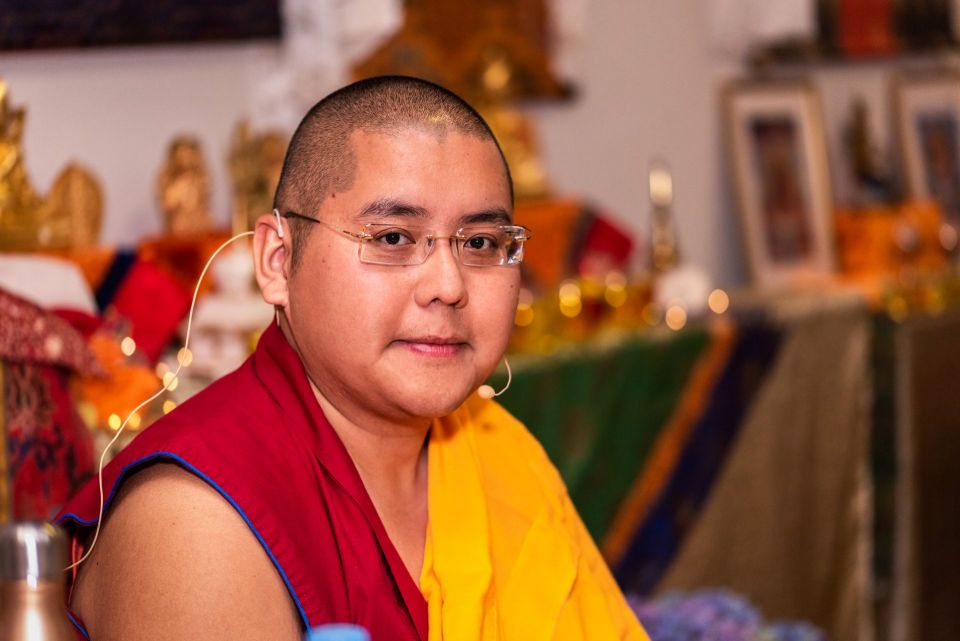
H.E. Ling Rinpoche at Centro Nagarjuna Madrid, Madrid, Spain, April 2019. Photo by Sonia Martinez.
His Eminence the 7th Kyabje Ling Rinpoche visited Spain from April 9-20, 2019, teaching in Barcelona, Madrid, and Valencia at events supported by FPMT Hispana centers Centro Nagarjuna Barcelona, Centro Nagarjuna Madrid, and Centro Nagarjuna Valencia. Núria Sala, Centro Nagarjuna Barcelona spiritual program coordinator; Susana Sáiz Medinger, Centro Nagarjuna Madrid spiritual program coordinator; and Stephen Milton, Centro Nagarjuna Valencia center director, share the story.
His Eminence Ling Rinpoche’s teachings in Barcelona were organized by three Dharma centers: Centro Nagarjuna Barcelona, an Centro Budista Tara de Barcelona, and Fundació Casa del Tibet de Barcelona.
Rinpoche arrived at the Barcelona airport on April 9. Rafael Ferrer, FPMT Europe coordinator was there to welcome Rinpoche, along with the three center directors Ven. Marga Echezarreta, Ven. Anila Ridzing Chödrong, and Ven. Thubten Wangchen. Tibetans and students from all three centers also came. Many people brought flowers and H.E. Ling Rinpoche was very happy.
Each center contributed what they had to offer: accommodation for Rinpoche was provided by Centro Budista Tara de Barcelona; a teaching hall was offered by Fundació Casa del Tibet de Barcelona; and Centro Nagarjuna Barcelona supported the entire event. The centers worked together with a lot of harmony.
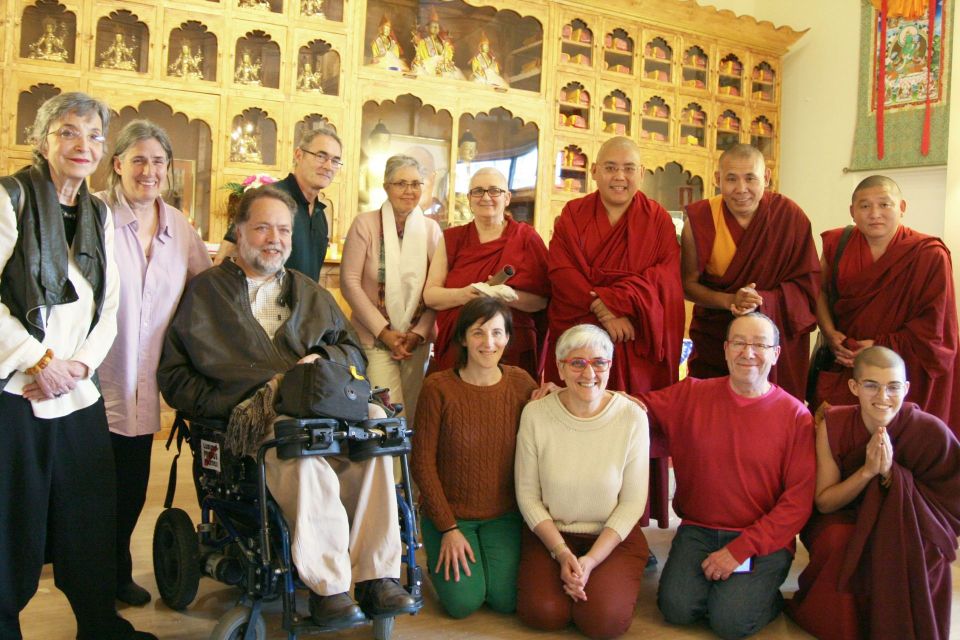
H.E. Ling Rinpoche with Mar Corominas, Jualia Montero, Xavier De Juan, Joan Ordeix, Núria Sala, Ven. Marga Echezarreta, Geshe Rinchen, Geshe Lobsang Yonten, Ana Esteban, Montse Quera, Andreu Estany, and Ven. Tenzin Nangse at Centro Nagarjuna Barcelona, Barcelona, Spain, April 2019. Photo by Carlos Henao.
Everyone enjoyed the three days of teachings and initiations very much, and H.E. Ling Rinpoche was very happy, always smiling. The teachings were translated by Ven. Tenzin Nangse (Ana González), Lotsawa Rinchen Zangpo Translation Program graduate and Centro Nagarjuna Barcelona translator. Rinpoche promised to return to Barcelona. The three centers were very happy, committing to organize it together. The room capacity was two hundred people, and every day it was full. Tickets sold out in a month. For the three centers these teachings were a blessing.
H.E. Ling Rinpoche visited and blessed Centro Nagarjuna Barcelona on April 11, and enjoyed a meal served by members of the Tibetan community. Then Rinpoche and some students took a walk by the sea.
Rinpoche gave teachings and offered blessings at the two other Dharma centers, and visited Benedictine Monastery Santa Maria de Montserrat. From my humble opinion I think that everyone—organizers, teachers, members of the public, students, and more—were very happy Rinpoche visited us, and are waiting for Rinpoche to come back soon.
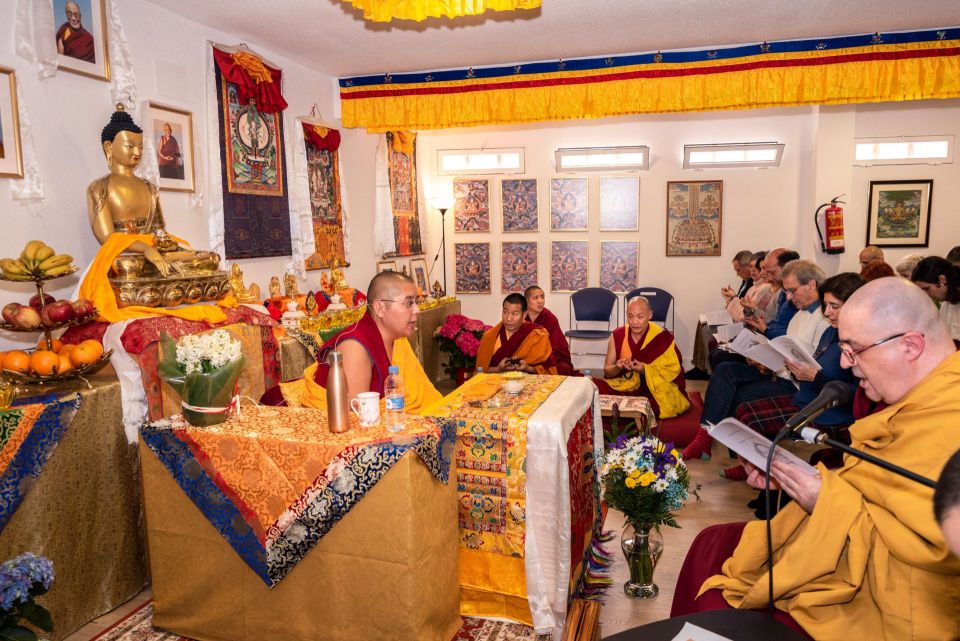
H.E. Ling Rinpoche at Centro Nagarjuna Madrid, Madrid, Spain, April 2019. Photo by Sonia Martinez.
On the morning of April 17, Rinpoche arrived in Madrid accompanied by two attendants. Approximately fifteen people were waiting for Rinpoche with incense, khatas, flowers, and an abundance of happiness and smiles.
In the evening Rinpoche was taken to Centro Nagarjuna Madrid were more than one hundred people waited for the teachings and transmission. More than twenty people—many who seemed to have a previous connection with Rinpoche—had collaborated in advance of the event, helping to make the center look beautiful. The precious teachings moved everybody, and people were so happy—even in joyful tears—so that when Rinpoche said we could all go for dinner together, many people came to the restaurant to enjoy Rinpoche’s company. Twenty of us sat together in the restaurant, sharing experiences and laughs with Rinpoche, and had a great time.
Even though it was a very short visit everybody who attended was so touched by Rinpoche’s presence. We publicly invited Rinpoche to please, please, please come back soon to Madrid. Rinpoche said he would be happy to come back.
The morning Rinpoche left for Valencia, a group of people were at the station with khatas to wish Rinpoche a good journey. We all went home with a deep feeling in our hearts that we had made a great connection with a magnificent guru. We thank Rinpoche for the marvelous teachings, and wish Rinpoche a very long life so we and many other beings can benefit from Rinpoche’s teachings, presence, and nectar of wisdom.
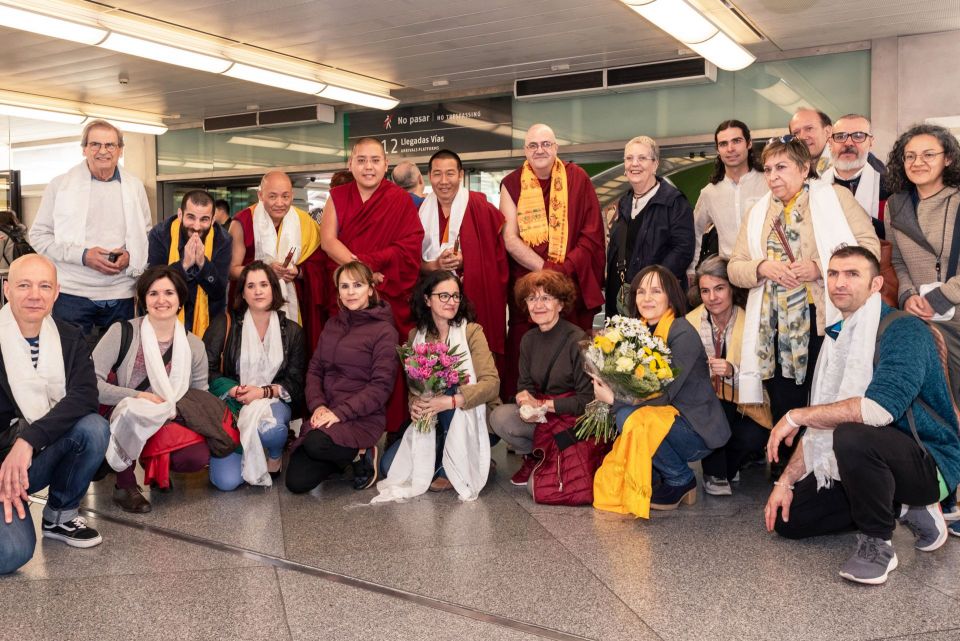
H.E. Ling Rinpoche with Pablo, Daniel Badran, Geshe Lobsang Tendar, Geshe Thubten Chöden, Ven. Fabio Poza, Marion Lambert, Javier Valverde, Carmen Blazquez, Raul, student, Karen Molina, Fernando Fernandez, Lydia, two students, Ana Maria Izquierdo, Marisa Femenía, Susana Sáiz, Maria, and Alberto at Madrid Atocha train station, Madrid, Spain, April 2019. Photo by Sonia Martinez.
It was a huge honor for Centro Nagarjuna Valencia to host H.E. Ling Rinpoche, one of the most important lamas of this day and age.
Geshe Lamsang—our resident lama and a disciple of His Holiness the 6th Kyabje Yongzin Ling Rinpoche—wanted to give a warm traditional welcome for such a high lama, so it was red carpet treatment (literally) accompanied by the sound of Tibetan trumpets. Rinpoche was led along the red carpet through clouds of fragrant incense all the way from the entrance of Centro Nagarjuna Valencia to the throne in the gompa where Geshe-la made a mandala offering of body, speech, and mind followed by an offering of Tibetan butter tea and auspicious rice.
Rinpoche said how much Rinpoche enjoyed the welcome, and that Rinpoche would hopefully see us all again later on in the teachings.
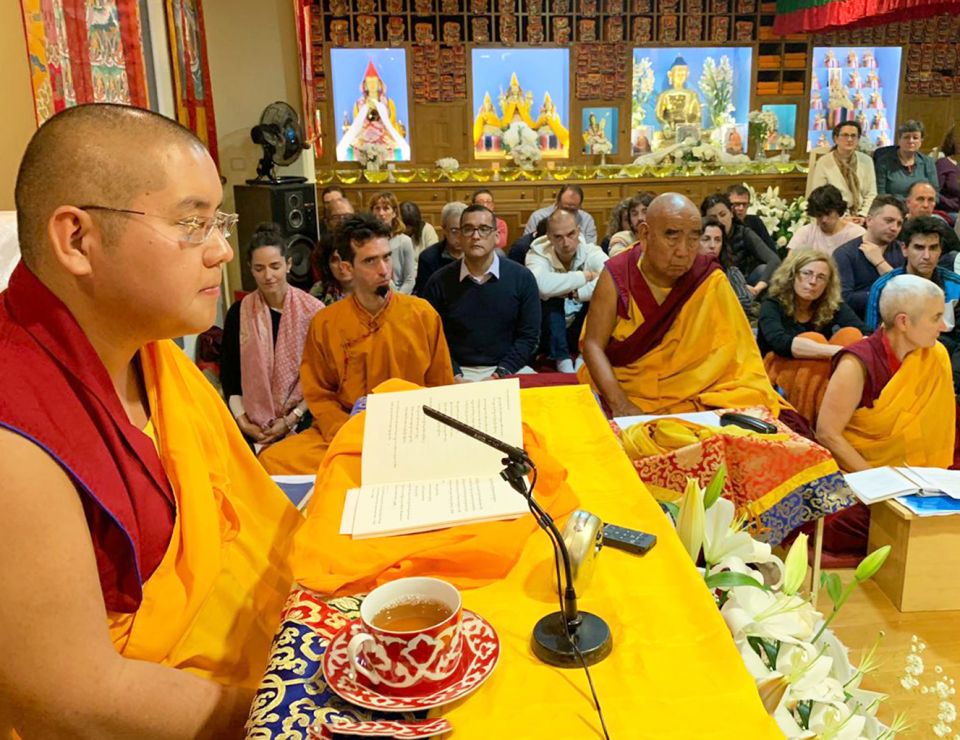
H.E. Ling Rinpoche, Tenzin Osel Hita, Geshe Lamsang, Ven. Paloma Alba, and students at Centro Nagarjuna Valencia, Spain, April 2019. Photo by Geshe Tenzin Khentse.
More than a hundred people attended the public talk in the evening, a commentary on the text Separating from the Four Attachments. Rinpoche’s explanation was profound and precise and covered the whole path to enlightenment. While listening to Rinpoche’s instructions you got the feeling that actually separating oneself from the various kinds of attachment that prevents us from becoming Buddhas was definitely possible. Sitting there in front of Rinpoche, the ultimate goal—for a while at least—suddenly seemed a little bit closer.
It hardly ever rains in Valencia, but from the moment Rinpoche arrived until Rinpoche left Valencia, it rained hard. At the end of the talk we thanked Rinpoche for bringing the much needed rain to Valencia, and even more importantly a rain of Dharma nectar to subdue our minds; hopefully we can all put it into practice!
For more information about H.E. Ling Rinpoche’s schedule, visit Rinpoche’s website:
http://lingrinpoche.info/
For more information about FPMT Spain, visit their website:
http://fpmt-hispana.org/en/
FPMT.org and Mandala Publications brings you news of Lama Zopa Rinpoche and of activities, teachings, and events from over 160 FPMT centers, projects, and services around the globe. If you like what you read, consider becoming a Friend of FPMT, which supports our work.
24
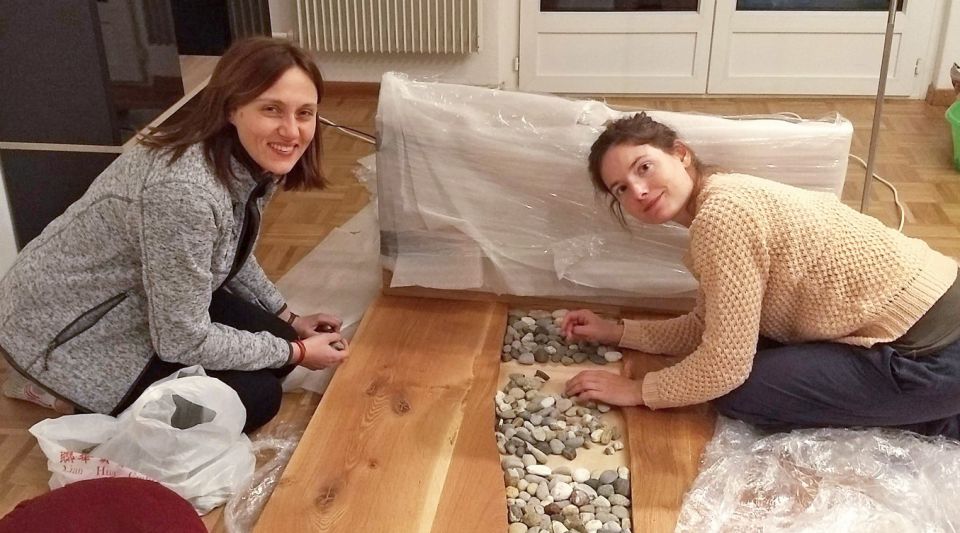
Nina and Jelena making the Lhagsam Tibetan Meditation Study Group altar beautiful, Zurich, Switzerland, January 2019. Photo by Jeff.
Lhagsam Tibetan Meditation Study Group, the FPMT study group in Zurich, Switzerland, opened their new location on October 1, 2018. Nina, Lhagsam Tibetan Meditation Study Group coordinator shares the story.
Lhagsam Tibetan Meditation Study Group started in Zurich in December 2015 due to the kind advice of Ven. Robina Courtin, an FPMT registered teacher. Some of the original students—who came to the very first teaching given by Geshe Thubten Sherab, an FPMT registered geshe—are still with the group today, meeting every week for the FPMT Discovering Buddhism course. We began looking for a more permanent location a few years ago so we could expand our program offerings.
Be courageous.
We quickly realized that it was not easy in a posh and expensive place like Zurich. After looking very intensely for months to no avail, we finally decided to give it a break. That’s exactly when the perfect place popped up. We went to look at it, even though the landlord told us that they already had an application from a consulting company. We thought, “If this is the place for Lhagsam, then somehow we will get it.” The rental market in Zurich is very tight and in order to get a place you have to win a competition for the best applicant, especially in the city center. We just applied and prayed.
Be professional.
We got a call a couple days later to let us know that the building owner decided to choose us over the consulting company. The owner wanted to have more spirituality and good energy for the building.
Since we wanted to have a beautiful place, we somehow managed to convince a great interior designer to help us design our gompa. Our group got so excited to have our own place that we worked day and night, even finishing our altar by hand. The energy and harmony was just incredible, and it stayed this way. We Lhagsamers are a circle of best friends.
The gompa is finished at this point, and our program offerings and our group are slowly expanding. We could already write books about the amazing teachers and teachings we were able to bring into the heart of Zurich so far in 2019. We are now working to furnish the second room upstairs, which will be our “Green Tara Lounge,” a place where we can sip tea, relax, and chat about Dharma.
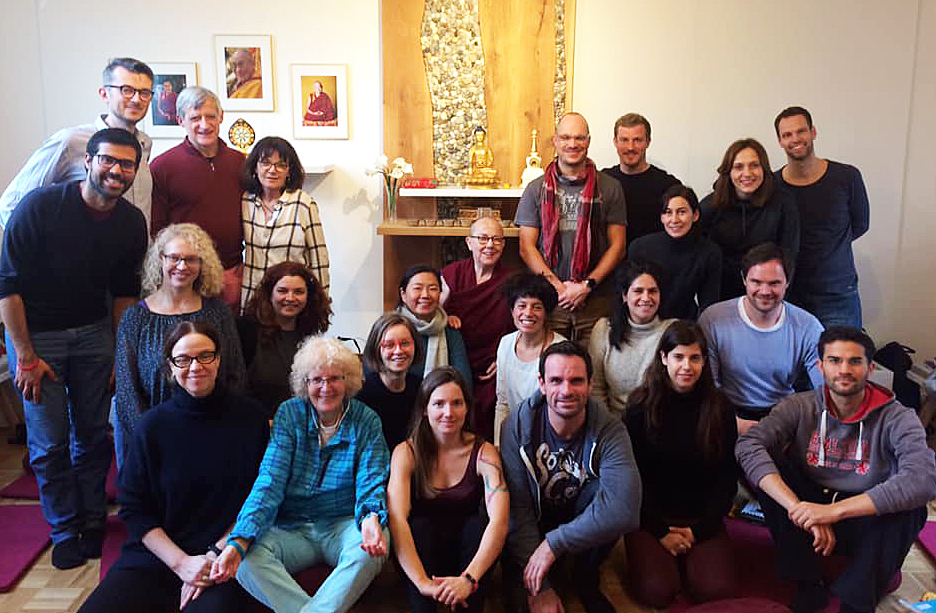
Students with Ven. Robina Courtin at Lhagsam Tibetan Meditation Study Group, Zurich, Switzerland, January 2019. Photo by Stefania.
Trust the guru.
We heard that Lama Yeshe always advised FPMT study groups to be courageous and professional. We courageously followed our dream, and thanks to the blessing of Lama Zopa Rinpoche—who has inspired and blessed our group all along—we were able to realize that dream. Now we want to become “professional” in offering an oasis of peace and harmony as well as the most precious, profound teachings of Buddhadharma in the heart of Zurich.
May every tiniest virtuous activity done at Lhagsam be the cause for our most precious gurus His Holiness the Dalai Lama and Lama Zopa Rinpoche to have long lives, completely free of obstacles. May every being that ever enters Lhagsam be in the presence of Lama Zopa himself and quickly attain enlightenment. May every word uttered at Lhagsam be most powerful, as if it was coming from Lama Zopa himself, and may the Lhagsam Tibetan Meditation Study Group bring limitless benefit to all sentient beings.
For more information about Lhagsam Tibetan Meditation Study Group, visit their website:
https://lhagsam.ch
FPMT.org and Mandala Publications brings you news of Lama Zopa Rinpoche and of activities, teachings, and events from over 160 FPMT centers, projects, and services around the globe. If you like what you read, consider becoming a Friend of FPMT, which supports our work.
20
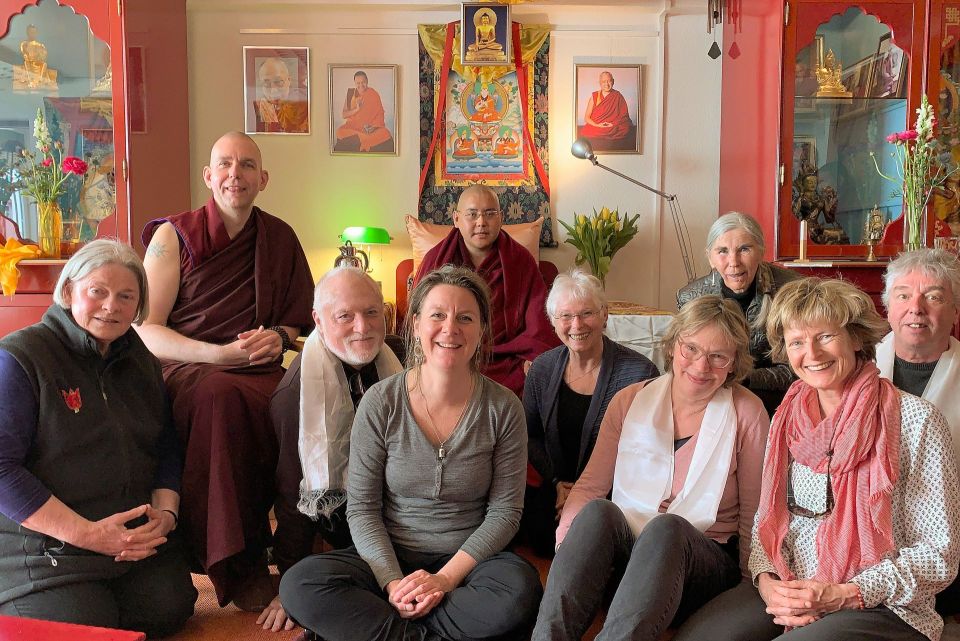
H.E. Ling Rinpoche with Vera Kappers; Ven. Losang Gendun; Hermes Brandt; Janneke Langeveld; Paula de Wijs; Els Wittermans; Marja Dijkstra; Annelies van der Heijden; and Karel Vellekoop, Maitreya Instituut Amsterdam, the Netherlands, April 2019. Photo by Netty Leleulya.
His Eminence the 7th Kyabje Ling Rinpoche visited the Netherlands from March 30-April 8, 2019, teaching at several Dharma centers including FPMT center Maitreya Instituut Loenen, where Rinpoche gave the White Tara long life empowerment. Annelies van der Heijden, Maitreya Instituut Amsterdam spiritual program coordinator and FPMT registered teacher; and Liang Tjoa, chairman of the board of directors of Dharma center Kadam Chöling collaborated to invite Rinpoche to the Netherlands and organize the events. Paula de Wijs, Maitreya Instituut Amsterdam center director; Maarten de Vries, Maitreya Instituut Loenen assistant director; and Annelies share the story.
On March 30 students in Amsterdam, the Netherlands, had the privilege of welcoming H.E. Ling Rinpoche to Europe from India for the start of Rinpoche’s two-month tour through Europe. Rinpoche liked the relatively cold weather and fresh air in the Netherlands.
The next day Rinpoche accepted a last-minute invitation to visit the Tibetan School in Amsterdam and took sincere interest in the classes. Many children and parents gathered at the school.
Our city center, Maitreya Institute Amsterdam, hosted Rinpoche for a small informal tea with some volunteers and International Campaign for Tibet staff. There were a number of discussions and exchanges over tea and petit fours. Everyone appreciated Rinpoche’s kind and practical approach to answering questions, as well as Rinpoche’s advice—especially about community building, which resonated with all present.
The following morning, April 1, Rinpoche greatly enjoyed seeing Amsterdam’s blossoming flowers, house boats, old houses, and beautiful canal scenery. That afternoon and the following morning Rinpoche visited two other Dharma groups in the city, Rigpa Amsterdam and Jewel Heart Nijmegen, bestowing the Medicine Buddha Jenang at Jewel Heart on the morning of April 2.
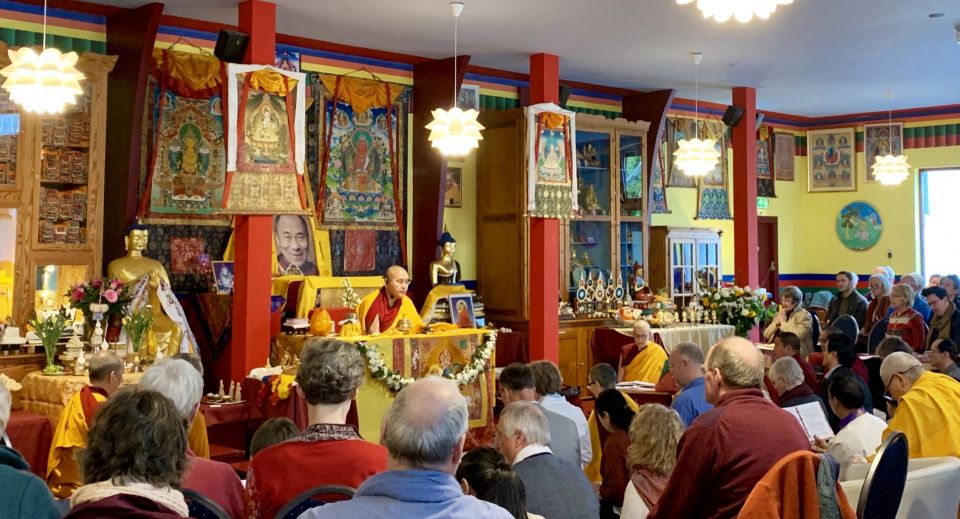
H.E. Ling Rinpoche teaching at Maitreya Instituut Loenen, Loenen, the Netherlands, April 2019. Photo by Netty Leleulya.
Afterwards our retreat center Maitreya Institute Loenen had the great honor to host Rinpoche until the following afternoon.
Rinpoche was enthusiastically greeted by Geshe Sonam Gyaltsen, Maitreya Instituut Loenen’s FPMT resident geshe, our center director, staff, and volunteers. Rinpoche was presented tea and snacks, and enjoyed lively conversations with Geshe-la and sangha members before taking a tour of our retreat center.
Our team then got back to work, lovingly arranging flower arrangements and extensive offerings while Rinpoche’s attendant sculpted tormas in the kitchen. The atmosphere was busy but relaxed and very joyous.
The next morning, on Wednesday, April 3, while Rinpoche was in the gompa preparing for the White Tara long life empowerment, a steady stream of smiling faces came in through the front door. For a number of the 142 attendees, this event was especially poignant because they had been students of His Holiness the 6th Yongzin Ling Rinpoche Thupten Lungtok Namgyal Thinely.
After taking the ritual sip of saffron water we entered the shrine room in silence. Rinpoche was soft spoken and unhurried, taking his time to carefully guide us through the visualizations. Ven. Tenzin Pellha, Maitreya Instituut’s interpreter, skillfully channeled Rinpoche’s words. Geshe Sonam Gyaltsen and Geshe Ngawang Zopa attended the empowerment and gave helpful last-minute suggestions.
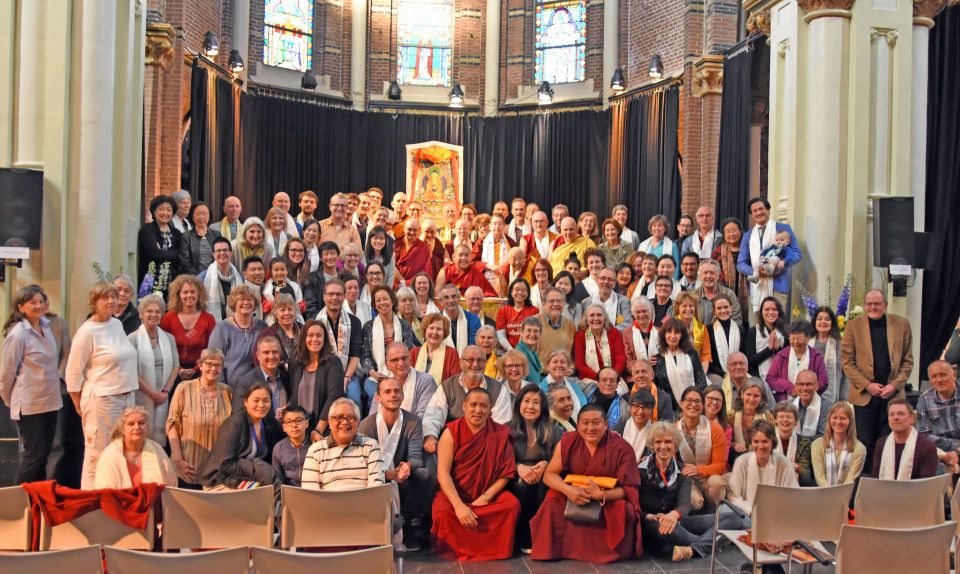
H.E. Ling Rinpoche with students, Amsterdam, the Netherlands, April 2019. Photo by Netty Leleulya.
From the moment Rinpoche arrived, we were surrounded by an almost palpable atmosphere of sacredness. When the moment came to say goodbye—after a nice lunch with volunteers—we knew this visit had been a profound blessing.
Next, on April 4, was a visit to Kadam Chöling in Haarlem, the Netherlands, where Rinpoche bestowed the Manjushi jenang.
Rinpoche’s official visit to the Netherlands came to a close with a two-day teaching on Je Tsongkhapa’s lamrim text Songs of Spiritual Experience jointly organized by Maitreya Institute and Kadam Chöling. The teachings were held on April 6 and 7 in the middle of the city in the beautiful old church Posthoornkerk.
Rinpoche left for Barcelona, Spain, on the morning of April 9 to continue his European tour. We are extremely grateful that Rinpoche and his team spent so much time in Holland, and that they visited Maitreya Institute Amsterdam and Maitreya Institute Loenen in addition to many other sangha groups and places, connecting so well with everyone.
We deeply thank everyone who made this visit possible and rejoice in the harmonious collaboration between different sangha communities. We sincerely hope that we’ve paved the ground for Rinpoche to return to the Netherlands and Maitreya Institute soon, and then many more times in the future.
For more information about H.E. Ling Rinpoche’s schedule visit Rinpoche’s website:
http://lingrinpoche.info/
For more information about Maitreya Instituut, visit their website:
https://maitreya.nl/index.htm
FPMT.org and Mandala Publications brings you news of Lama Zopa Rinpoche and of activities, teachings, and events from over 160 FPMT centers, projects, and services around the globe. If you like what you read, consider becoming a Friend of FPMT, which supports our work.
17
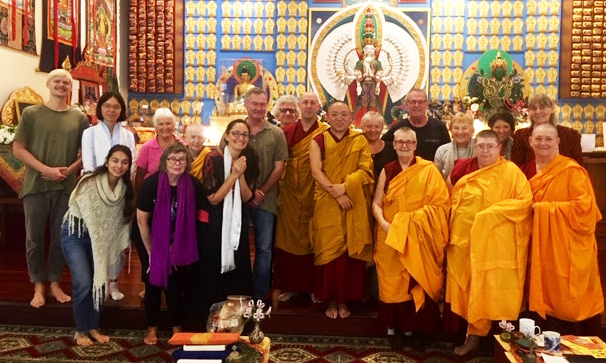
Lama Tsongkhapa Guru Yoga Retreat at Chenrezig Institute, Eudlo, Queensland, Australia, April 2019. Photo by Maria Corrales.
Chenrezig Institute, an FPMT center in Eudlo, Queensland, Australia, organized their third annual five-day Lama Tsongkhapa Guru Yoga Retreat on April 18-22, 2019. Maria Corrales, spiritual program assistant, shares the story.
Lama Tsongkhapa is a name effusively present in the prayers, texts, and teachings of the Gelug tradition. His image can be found in statue, tsa-tsa, or thangka form on virtually every Gelug altar. As the founder of this great lineage, we honor Lama Tsongkhapa’s memory and profound contributions to Tibetan Buddhism, especially on this 600th anniversary of his death.
With the passage of so much time it is easy to begin to think of Lama Tsongkhapa as more of a deity than an historic person. For many of us this is accompanied by a vagueness of attributed good qualities, but indistinction is not fertile ground for inspiration. We must bring Lama Tsongkhapa into sharp focus in our minds so that he may serve as a polestar to guide us on our way.
The Lama Tsongkhapa Guru Yoga practice is one that brings us closer to Lama Tsongkhapa, creating the karma to meet a reliable spiritual friend to guide us and awaken the vast qualities he possessed within ourselves.
This April at Chenrezig Institute, we completed our third annual five-day Lama Tsongkhapa Guru Yoga Retreat. The retreat was led by Australian nun Venerable Thubten Chokyi, an FPMT registered teacher and director of the Liberation Prison Project. Geshe Phuntsok Tsultrim, our FPMT resident geshe, participated in the retreat alongside our students. Throughout the retreat Geshe-la sprinkled gems of insight and guidance to sharpen our focus and energize our aspirations to become like the great Lama Tsongkhapa.
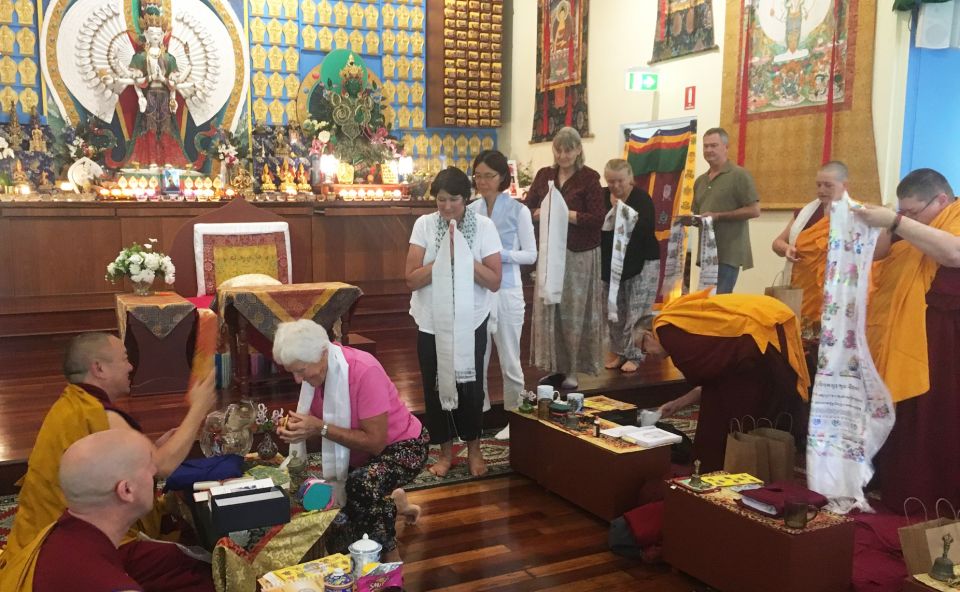
Lama Tsongkhapa Guru Yoga Retreat at Chenrezig Institute, Eudlo, Queensland, Australia, April 2019. Photo by Maria Corrales.
Together we purified, paid homage, and humbly requested that we might quickly become like Lama Tsongkhapa ourselves. With as many as twenty-four students participating in a practice session, we accumulated more than 20,000 Migstema mantras. The merit of these mantras was offered to Geshe Phuntsok Tsultrim that all his Dharma wishes may succeed instantly.
It is reliable teachers like Geshe-la who have carried the lineage of profound lamrim teachings in an unbroken continuum from Lama Tsongkhapa to us six-hundred years down the line. May we be worthy vessels to realize the great wisdom and compassion he embodied and help carry Lama Tsongkhapa’s teachings into the future.
For more information about Chenrezig Institute, visit their website:
https://www.chenrezig.com.au/
To learn more about Lama Tsongkhapa, read “The Mahasiddha Je Tsongkhapa” by Lama Yeshe:
https://fpmt.org/mandala/archives/older/mandala-issues-for-1995/november/the-mahasiddha-je-tsong-khapa/
FPMT.org and Mandala Publications brings you news of Lama Zopa Rinpoche and of activities, teachings, and events from over 160 FPMT centers, projects, and services around the globe. If you like what you read, consider becoming a Friend of FPMT, which supports our work.
- Tagged: chenrezig institute, geshe phuntsok tsultrim, lama tsongkhapa, maria nobuko corrales, ven. thubten chokyi
10
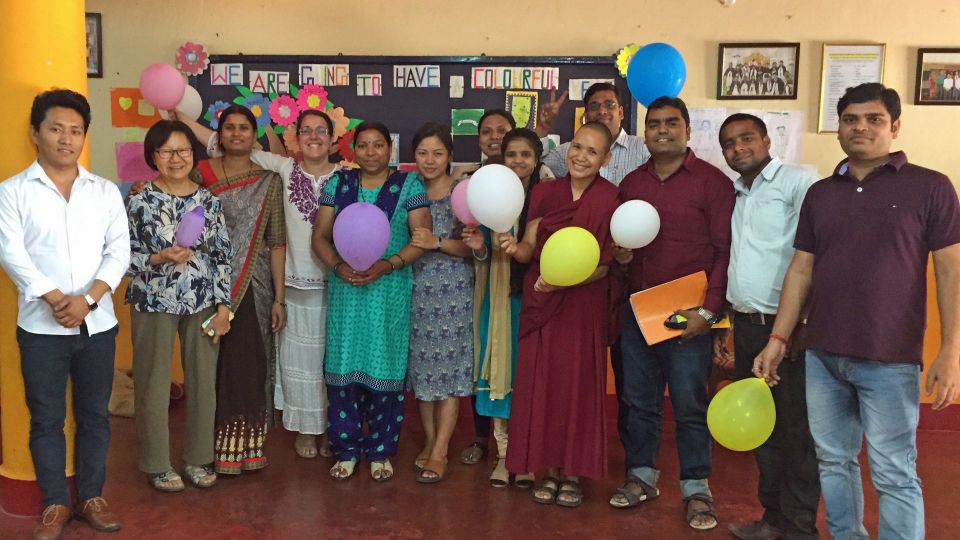
Pema Tsering, Oi Loon Lee, Khusboo, Ceci Buzón, Nanda Devi, Samten Dolma, Sapna Pradhan, Sonali Kumari, Sanjeev Kumar, Ven. Anshu Negi, Ajit Mishra, Rohan Kumar, and Amar Kumar at Maitreya School, Bodhgaya, India, April 2019. Photo by Katherine Demsky.
In 2018 Maitreya School—a project of Root Institute, the FPMT center in Bodhgaya, Gaya District, Bihar, India—began partnering with Cecilia (“Ceci”) Buzón, a Foundation for Developing Compassion and Wisdom (FDCW) accredited 16 Guidelines for Life Level 2 facilitator; teacher; and co-founder of FDCW national group Fundación Educación Universal Patagonia-Argentina to bring the 16 Guidelines for Life to Maitreya School. Ceci and Pema Tsering, Maitreya School principal, share the story.
“I traveled to India in 2018,” Ceci said,” and by chance visited Maitreya School while in Bodhgaya and met Pema. Within ten minutes of conversation we already knew we wanted to work together. Maitreya School needed a 16 Guidelines for Life facilitator, and so we started organizing the first online 16 Guidelines for Life level 1 course.”
Pema shared about that July 2018 online course. “Every Saturday for two hours, we got an opportunity to have face-to-face interaction with Ceci and peer groups among the teachers. It provided a platform for us to exchange our views, discuss, and reflect on the lessons.”
“Pema and I met again in August 2018,” Ceci shared, “for a 16 Guidelines for Life for children workshop at the 16 Guidelines Retreat Gathering hosted by FDCW national group Education Universelle France held at Institut Vajra Yogini, the FPMT center in Toulouse, France.”
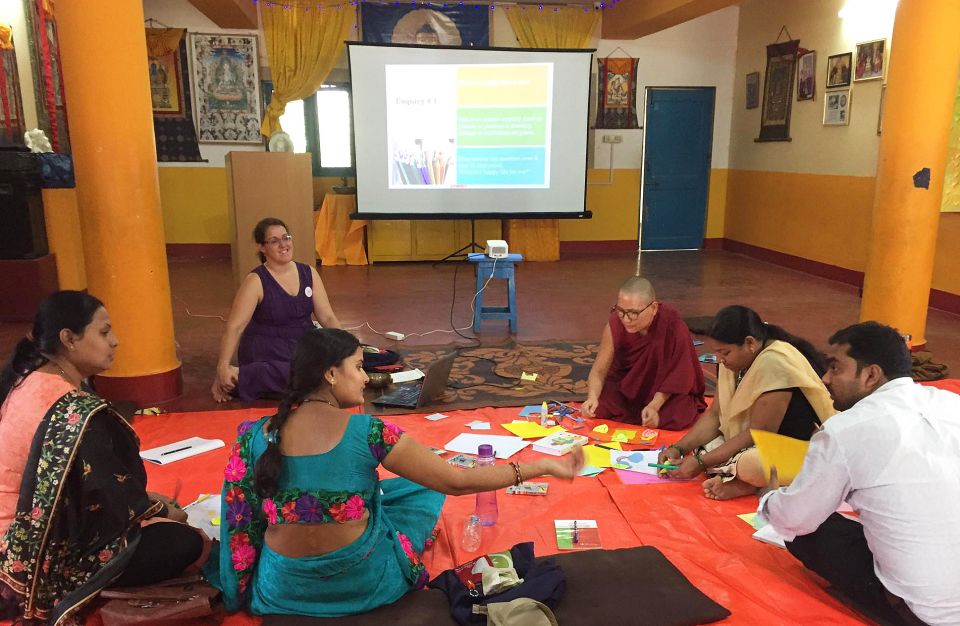
Sapna Pradhan, Ceci Buzón, Khusboo, Ven. Anshu Negi, Nanda Devi, and Ajit Mishra at Maitreya School, Bodhgaya, India, April 2019. Photo by Katherine Demsky.
“Ceci facilitated a really wonderful workshop about how we can teach the 16 Guidelines for Life to children by using art,” Pema said. “It was very important for our school because we very rarely use art and different activities to teach lessons. I found this was a very exciting and enjoyable way to teach. Also, children enjoy learning the lesson; it is fun and entertaining. Ceci used lots of activities during the workshop. This gave us new ideas to create our own activities suitable for our children’s mental levels.
“It was also very interesting to learn how each of the 16 Guidelines for Life is linked with its wisdom theme,” Pema said. “There are a lot of thinking and reflection exercises we never thought of before. These exercises give us the chance to see within ourselves and transform our minds. It keeps our minds healthy and stable.”
Pema continued, “We must practice and habituate it in our daily life. When thinking, reflecting, and contemplation become our habits, it will be easier for us to face emotional difficulties like anger and jealousy. So, it is very important for ourselves and our children to become more happy and peaceful people. We can more effectively implement these different methods into Maitreya School’s teaching process in the future.
“I was so thankful to Education Universelle France and Fundación Educación Universal Patagonia-Argentina, who organized the workshop and invited me to France, and to Institut Vajra Yogini for giving me accommodation and delicious food. It was an amazing experience.”
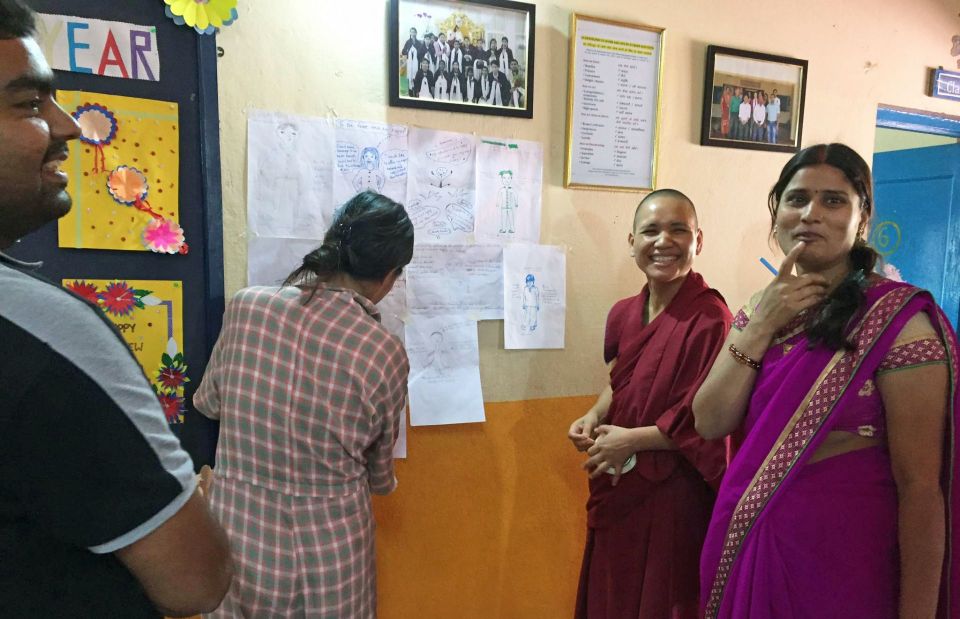
Ajit Mishra, Samten Dolma, Ven. Anshu Negi, and Kushboo at Maitreya School, Bodhgaya, India, April 2019. Photo by Katherine Demsky.
Ceci and Pema continued to collaborate to benefit Maitreya School. Ceci said, “We met in Bodhgaya in April 2019 to train the whole Maitreya School staff not only on the 16 Guidelines for Life and the four wisdom themes (How We Think, How We Act, How We Relate to Others, How We Find Meaning) but also on how to implement them with each age group. During the three-day workshop each teacher learned and planned how to take the 16 Guidelines for Life into the classroom through different school subjects like math, language, and social studies.”
Pema said, “The aim of the Maitreya School curriculum is to bring a good heart into our children and harmony into society. 16 Guidelines for Life teaches about universal values such as humility, patience, kindness, and gratitude. It helps to develop social and emotional skills in children, which are important for their well-being, learning, and life skills. We have committed to make the 16 Guidelines for Life the first priority for the school.
“Maitreya School is thankful for Ceci who has offered us her precious time and energy in order to share her knowledge, experience, and skills with our teachers,” Pema continued. “We also thank FDCW board member and co-chair Oi Loon Lee for visiting our school and helping with the workshop. Our teachers appreciated this workshop very much. We will integrate the 16 Guidelines for Life into the teaching process at our school more effectively in comings days.”
For more information about Maitreya School, visit the Root Institute for Wisdom Culture website:
https://www.rootinstitute.ngo/social-service/maitreya-school
For more information about 16 Guidelines for Life, visit the Foundation for Developing Wisdom and Compassion website:
https://www.compassionandwisdom.org/
FPMT.org and Mandala Publications brings you news of Lama Zopa Rinpoche and of activities, teachings, and events from over 160 FPMT centers, projects, and services around the globe. If you like what you read, consider becoming a Friend of FPMT, which supports our work.
- Tagged: 16 guidelines, cecilia buzón, foundation for developing compassion and wisdom, maitreya school, pema tsering, root institute
4
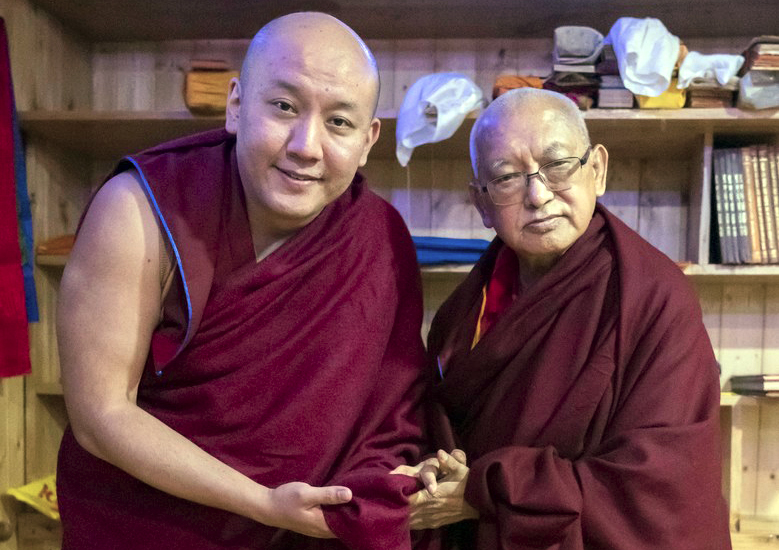
H.E. Zong Rinpoche and Lama Zopa Rinpoche, Tushita Meditation Center, Dharamsala, India, February 2019. Photo by Ven. Lobsang Sherab.
His Holiness the 3rd Kyabje Zong Rinpoche was one of Lama Zopa Rinpoche’s teachers. His Eminence the 4th Kyabje Zong Rinpoche—born in north India in 1985—visited Maitreya Instituut Loenen, an FPMT center in Loenen, the Netherlands, in April 2019. Maarten de Vries, Maitreya Instituut Loenen assistant director, shares the story.
After a teaching event in Germany, His Eminence Zong Rinpoche visited Maitreya Instituut for the third time. Our guest of honor arrived in the early evening and was greeted by Geshe Sonam Gyaltsen, our FPMT resident geshe; staff; and volunteers. The participants of a dance workshop at our conference center stopped what they were doing and eagerly joined the queue to offer khatas.
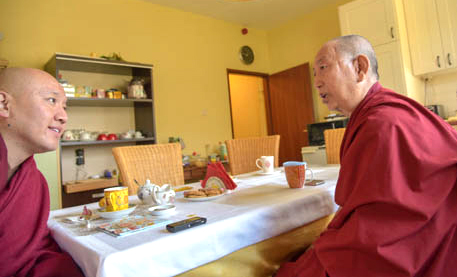
H.E. Zong Rinpoche and Geshe Sonam Gyalsten, Loenen, the Netherlands, April 2019. Photo by Willem van Steijn.
This time, Rinpoche added extra days to his stay in Loenen so he could spend more time together with Geshe Sonam Gyaltsen. His Holiness the 3rd Kyabje Zong Rinpoche was one of Geshe Sonam Gyaltsen’s main gurus.
Rinpoche had looked forward to spending time with Geshe Sonam Gyaltsen, and over dinner both engaged in animated conversation about the finer points of Buddhist philosophy. They had a few lively debate sessions during Rinpoche’s stay in Loenen, but both claimed the other one had won the debate.
The next day, a record breaking hot and sunny Easter Monday, about eighty attendees flowed into the center for the afternoon’s public talk. The theme—Community: Living and Working Together in Harmony—clearly seemed to have struck a chord. In his characteristic style, Rinpoche first approached the topic from various angles, then gradually zooming in on a number of key ideas. Rinpoche also shared some entertaining stories about life in the monastery.
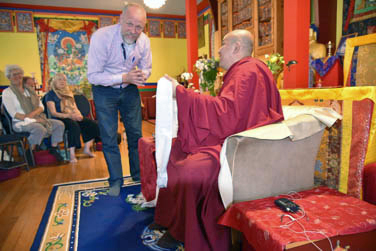
H.E. Zong Rinpoche offering a khata to Maarten de Vries, Maitreya Instituut, Loenen, the Netherlands, April 2019. Photo by Willem van Steijn.
Rinpoche expressed his preference for informal and open communication and sincerely connected with the audience. He gave lots of personal attention to those seeking his advice during the tea break and even until long after the event was over. He spoke thoughtfully, as if thinking out loud, always carefully choosing his words. With great skill he balanced Western psychological approaches with Buddhist philosophy.
Rinpoche invited us to ask questions and share our thoughts, which led to a detailed and personal reflection on guru devotion. The key message was to investigate a teacher well before entering a formal relationship. The main criteria—or “safety check” as Rinpoche called it—has to be the teacher’s ethical conduct. Similar to buying a car, our main concern should be safety, not the reputation, brand, or color of the car.
He then shared a little about a personal encounter he recently had with Kyabje Lama Zopa Rinpoche in India. He praised Rinpoche highly and remarked that the Vajrayogini initiation and retreat in France (which recently concluded) is a very rare opportunity. H.E. Zong Rinpoche congratulated those of us lucky enough to be able to attend this retreat.
We are very grateful for the opportunity to make a connection with H.E. Zong Rinpoche, and we hope to meet and receive teachings from Rinpoche again soon.
For more information about Maitreya Instituut Loenen, visit their website:
https://maitreya.nl/index.htm
Listen to H.E. Zong Rinpoche’s teachings at Maitreya Instituut Loenen in 2016, 2017, and 2018 on the center’s website:
https://www.maitreya.nl/studie-studenten-downloads-loenen-mp3-index.htm#z2
FPMT.org and Mandala Publications brings you news of Lama Zopa Rinpoche and of activities, teachings, and events from over 160 FPMT centers, projects, and services around the globe. If you like what you read, consider becoming a Friend of FPMT, which supports our work.
26
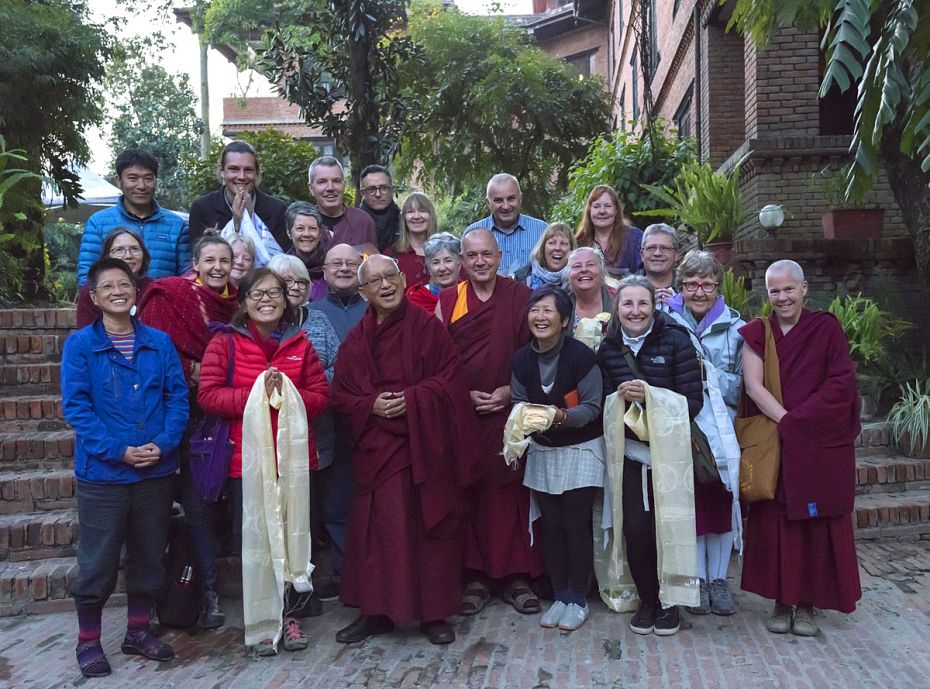
Lama Zopa Rinpoche and pilgrims at Hotel Vajra, Kathmandu, Nepal, February 2019. Photo by Ven. Lobsang Sherab.
In February 2018 a group of FPMT students traveled together from Australia to Kathmandu, Nepal, for a pilgrimage led by Gen Thubten Dondrub*, FPMT resident teacher at Buddha House, an FPMT center in Australia. In addition to encountering Lama Zopa Rinpoche in Nepal, the pilgrims visited many holy places: Boudhanath Stupa; Namo Buddha Stupa; Swayambhunath Stupa; holy sites in Sankhu, Pharping, and Patan; Nagi Gompa; the Maratika Caves; and ancient city temples associated with the deities Tara and Vajrayogini. This is a short excerpt from the online story, “FPMT Students Experienced that FPMT Family Feeling in Nepal,” compiled by some of the Buddha House pilgrims.
On February 3, 2018, twenty-two students from four FPMT centers in Australia—Buddha House; Hayagriva Buddhist Centre; Tara Meditation Centre; Vajrayana Institute; and the FPMT study group in Broome, Gyalwa Ensapa Buddhist Study Group—flew into Kathmandu, Nepal, for the beginning of what turned out to be very auspicious twenty-one days of pilgrimage.
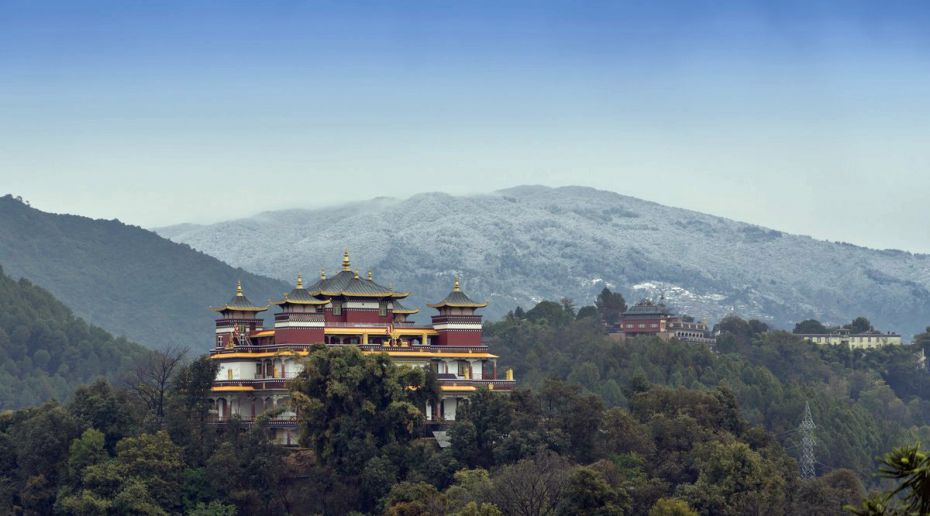
Snow in the mountains, a view from Kopan Monastery, Kathmandu, Nepal, February 2019. Photo by Ven. Lobsang Sherab.
Arriving at Kopan Monastery, the FPMT monastery in Kathmandu, around midnight, the group was greeted the next morning with a thrill—they discovered Lama Zopa Rinpoche was in residence at Kopan for Losar (Tibetan New Year) and would be there through to the Day of Miracles.
Lama Zopa Rinpoche advised in Practices for Pilgrimage: “How do we make pilgrimage as meaningful, useful and beneficial as possible? The main point of pilgrimage is to subdue our minds. By eliminating mistaken thoughts, not allowing the mind to be under the control of delusion, the mind is better able to actualize the lamrim realizations, from guru devotion up to enlightenment.”
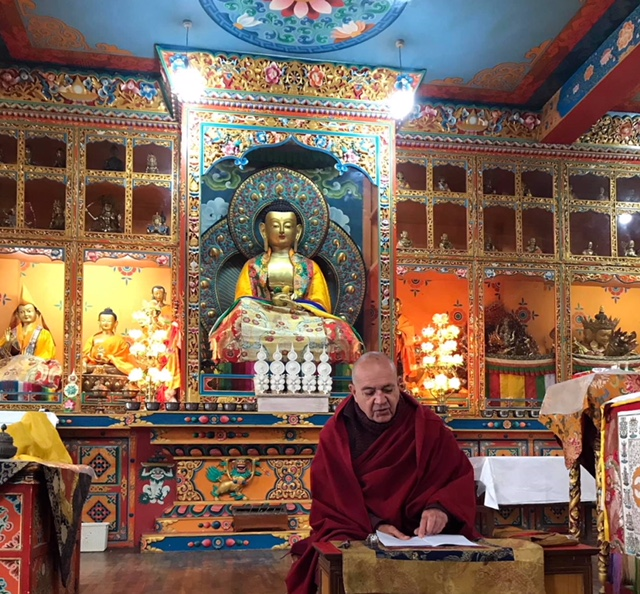
Gen Thubten Dondrub leading a short retreat on Orange Manjushri in the Tantric College Gompa at Kopan Monastery, Kathmandu, Nepal, February 2019. Photo by Sandy Faber.
Gen Thubten Dondrub began the pilgrimage with a strict pre-warning to those about to join him, saying, “You are not on a holiday.” We would be visiting the holy sites in Kathmandu, the Kathmandu Valley, and Maratika Caves where we would recite prayers, mantras, and engage in practices including tsog offerings.
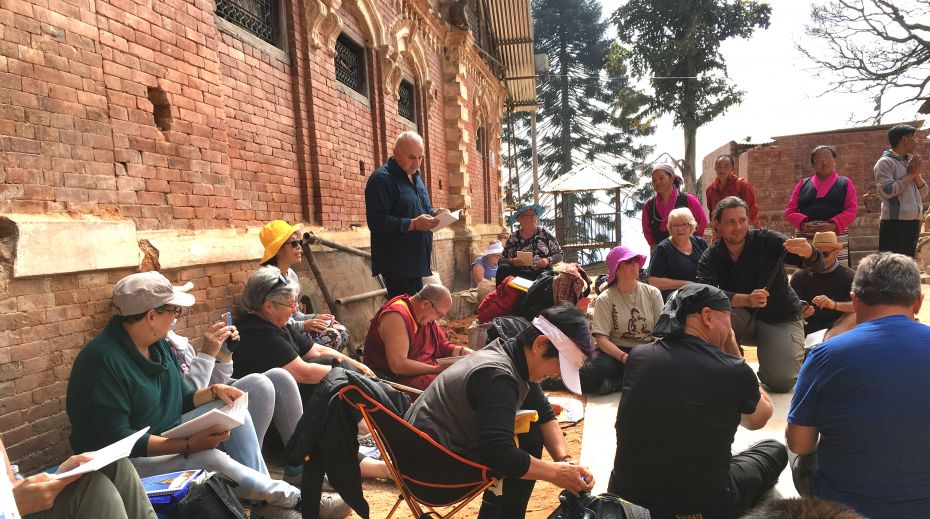
Gen Thubten Dondrub leading practices and tsog offerings, Sankhu, Nepal, February 2019. Photo by Peter Wagner.
Due to the kindness and great effort of Judy Wagner, Buddha House spiritual program coordinator, a portable altar, water bowls, and offerings were set up at each holy site—even if the tsog had to be guarded from cunning monkeys!
To fulfill Lama Zopa Rinpoche’s advice of not wasting time, Gen Thubten Dondrub made the most of our lengthy bus and jeep rides through Kathmandu traffic, leading Tara and Vajrasattva practices in the morning and dedications during the rides home. …
Read the Buddha House pilgrims’ online story in its entirety, “FPMT Students Experienced that FPMT Family Feeling in Nepal,” and view more of their photos online:
https://fpmt.org/mandala/in-depth-stories/buddha-house-pilgrims-experiened-that-fpmt-family-feeling-in-nepal/
* In 2019 Gen Thubten Dondrub requested Buddha House students formally refer to him as “Gen Thubten Dondrub.” He shared, “Usually monks and nuns of the FPMT are referred to as ‘Venerable.’ I have always found this term uncomfortable as it is a very exalted term and is used in the Catholic Church to refer to someone who is in line to be canonized as a saint. When I was in Taiwan I learned that every monk and nun was addressed as ‘Fa Shr’ from the moment they were ordained. The term means ‘Dharma teacher.’ The closest Tibetan equivalent is ‘ge.gen,’ often abbreviated to ‘Gen’ or ‘Gen-la.’ It is polite and friendly. So when people ask how to address me, I suggest using that term. It seems much more appropriate than ‘Venerable.'”
For more information about Buddha House, visit their website:
http://buddhahouse.org
FPMT.org and Mandala Publications brings you news of Lama Zopa Rinpoche and of activities, teachings, and events from over 160 FPMT centers, projects, and services around the globe. If you like what you read, consider becoming a Friend of FPMT, which supports our work.
- Home
- News/Media
- Study & Practice
- About FPMT Education Services
- Latest News
- Programs
- New to Buddhism?
- Buddhist Mind Science: Activating Your Potential
- Heart Advice for Death and Dying
- Discovering Buddhism
- Living in the Path
- Exploring Buddhism
- FPMT Basic Program
- FPMT Masters Program
- FPMT In-Depth Meditation Training
- Maitripa College
- Lotsawa Rinchen Zangpo Translator Program
- Universal Education for Compassion & Wisdom
- Online Learning Center
- Prayers & Practice Materials
- Overview of Prayers & Practices
- Full Catalogue of Prayers & Practice Materials
- Explore Popular Topics
- Benefiting Animals
- Chenrezig Resources
- Death & Dying Resources
- Lama Chopa (Guru Puja)
- Lama Zopa Rinpoche: Compendium of Precious Instructions
- Lama Zopa Rinpoche: Life Practice Advice
- Lama Zopa Rinpoche Practice Series
- Lamrim Resources
- Mantras
- Prayer Book Updates
- Purification Practices
- Sutras
- Thought Transformation (Lojong)
- Audio Materials
- Dharma Dates – Tibetan Calendar
- Translation Services
- Publishing Services
- Teachings and Advice
- Find Teachings and Advice
- Lama Zopa Rinpoche Advice Page
- Lama Zopa Rinpoche: Compendium of Precious Instructions
- Lama Zopa Rinpoche Video Teachings
- ༧སྐྱབས་རྗེ་བཟོད་པ་རིན་པོ་ཆེ་མཆོག་ནས་སྩལ་བའི་བཀའ་སློབ་བརྙན་འཕྲིན།
- Podcasts
- Lama Yeshe Wisdom Archive
- Buddhism FAQ
- Dharma for Young People
- Resources on Holy Objects
- Ways to Offer Support
- Centers
- Affiliates Area
- Teachers
- Projects
- Charitable Projects
- Make a Donation
- Applying for Grants
- News about Projects
- Other Projects within FPMT
- Support International Office
- Projects Photo Galleries
- Give Where Most Needed
- FPMT
- Shop
Subscribe to FPMT News
Translate*
*powered by Google TranslateTranslation of pages on fpmt.org is performed by Google Translate, a third party service which FPMT has no control over. The service provides automated computer translations that are only an approximation of the websites' original content. The translations should not be considered exact and only used as a rough guide.Superficial observation of the sense world might lead you to believe that people’s problems are different, but if you check more deeply, you will see that fundamentally, they are the same. What makes people’s problems appear unique is their different interpretation of their experiences.






